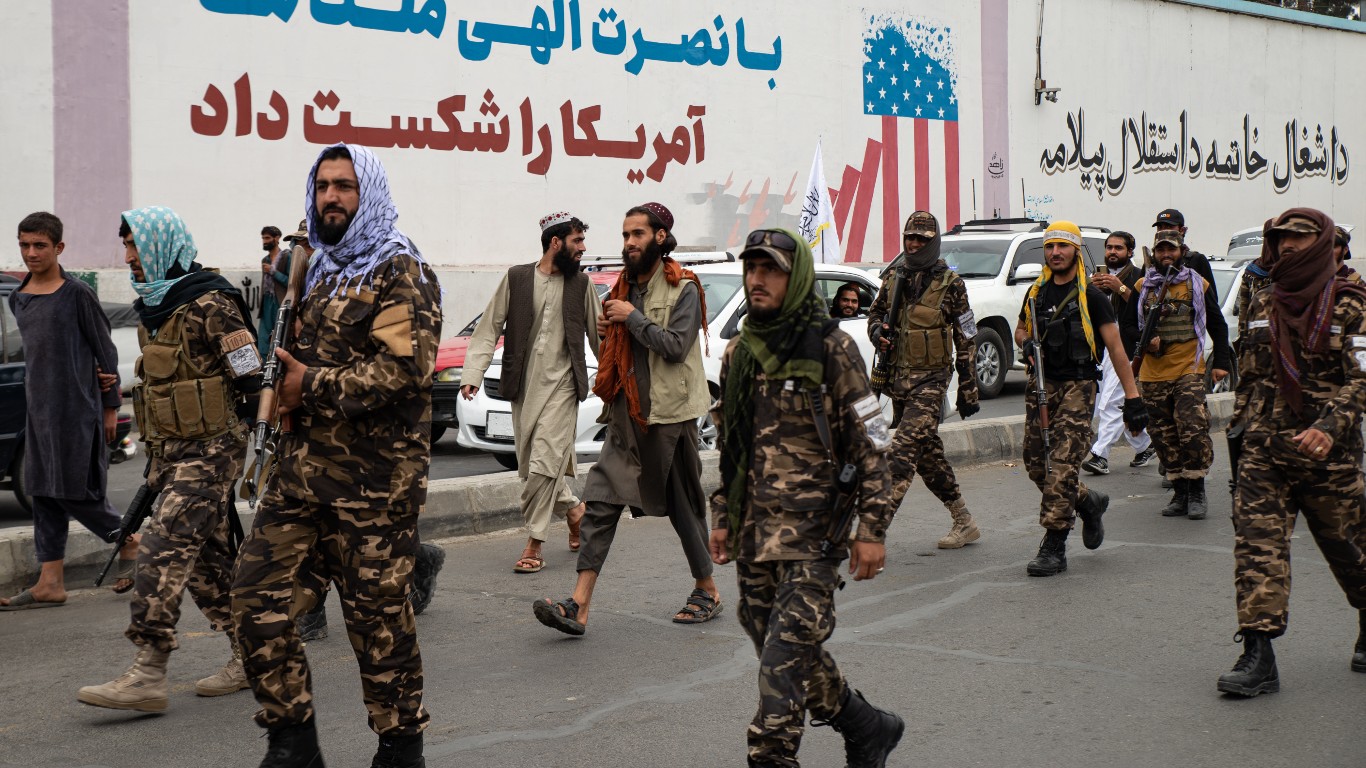
There were 369 violent crimes reported for every 100,000 Americans in 2018, nearly the lowest violent crime rate in the United States in more than three decades. In an interview with 24/7 Wall St., John Roman, a senior fellow with NORC at the University of Chicago, an independent social research institution, explained that the latest crime statistics reflect an encouraging continuation of a long-term trend.
“If you are under the age of 40, you’ve never been safer than you are today,” Roman said.
While the United States is safer than it has been for as far back as many Americans can remember, some cities are even safer, with violent crime rates less than half the current national rate. Using data from the FBI, 24/7 Wall St. reviewed violent crimes rates — a population-adjusted measure of incidents of rape, robbery, homicide, and aggravated assault — to identify America’s safest cities. Only the 294 midsize and large cities tracked by the FBI with populations of at least 100,000 were considered.
The cities with the lowest violent crime rates tend to share several other socioeconomic characteristics as well — notably, economic prosperity. “The more affluent a place is, the less crime there is on average,” Roman said. Indeed, the vast majority of the cities on this list have a low unemployment rate and a high median household income — some even rank among the wealthiest places in the country. Here is a look at the top 25 richest cities in America.
Many of these cities have capitalized on existing features — whether that means marketing a natural waterway or vista as a tourist destination — or industries built around a local university. “Successful cities market their assets and build around their assets,” Roman said.
With a healthy economy and safe streets, the population in the vast majority of cities on this list is growing rapidly. “Growing cities tend to grow because they’re perceived as safe, and that safety compounds in a virtuous cycle,” Roman said. “Safe places get safer.” Here is a look at America’s 25 fastest growing cities.
Click here to see America’s safest cities
Click here to read our methodology
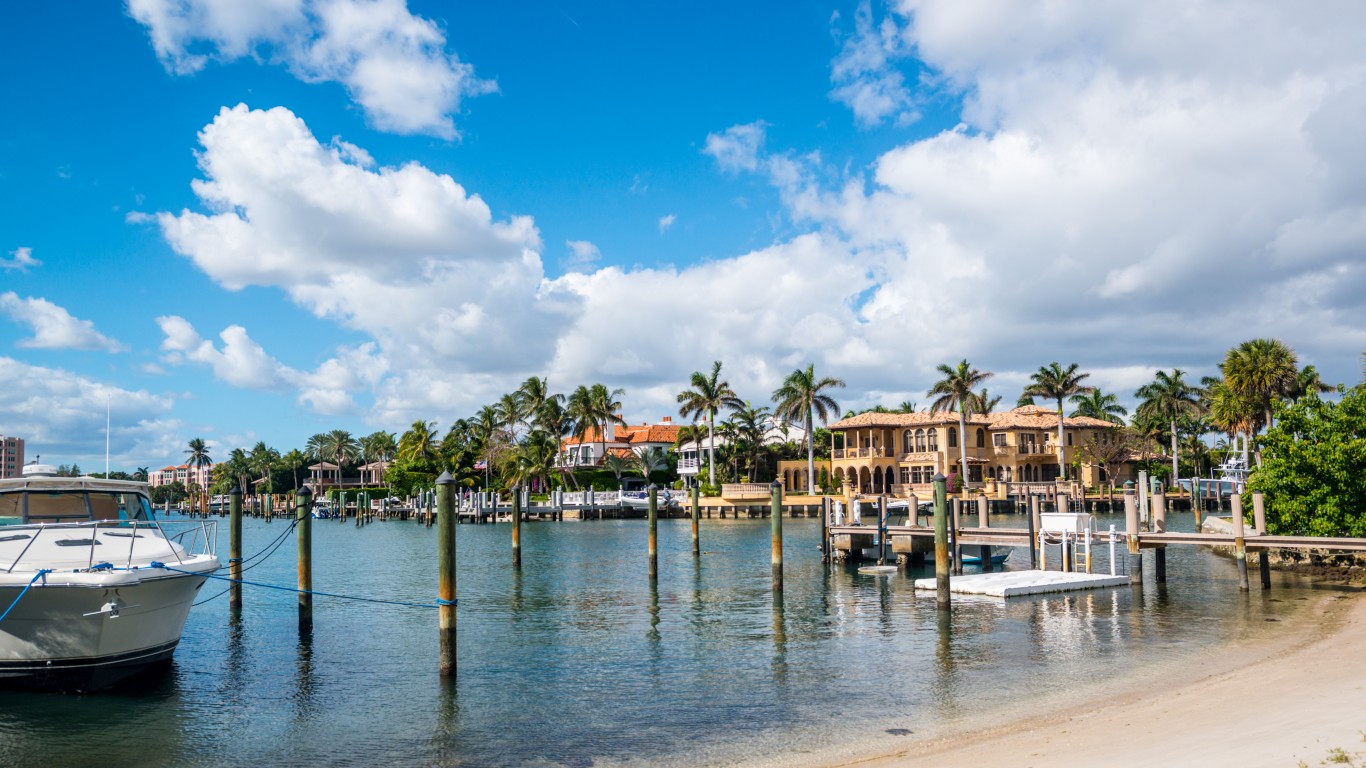
50. Boca Raton, Florida
> 2018 violent crime rate: 204.7 per 100,000 people
> 2018 homicides: 2
> Poverty rate: 8.4%
> 2018 unemployment rate: 3.1%
Boca Raton is one of only 50 U.S. cities with a population of at least 100,000 to report fewer than 205 violent crimes for every 100,000 people in 2018. For reference, there were 369 violent crimes for every 100,000 people nationwide the same year. The city, located along the coast of southeastern Florida, has 46 parks, a well-regarded public school system, and a healthy job market. As is often the case in cities on this list, Boca Raton is a relatively affluent city. Most area households earn at least $76,000 a year — far more than the comparable median income nationwide of $57,652.
[in-text-ad]
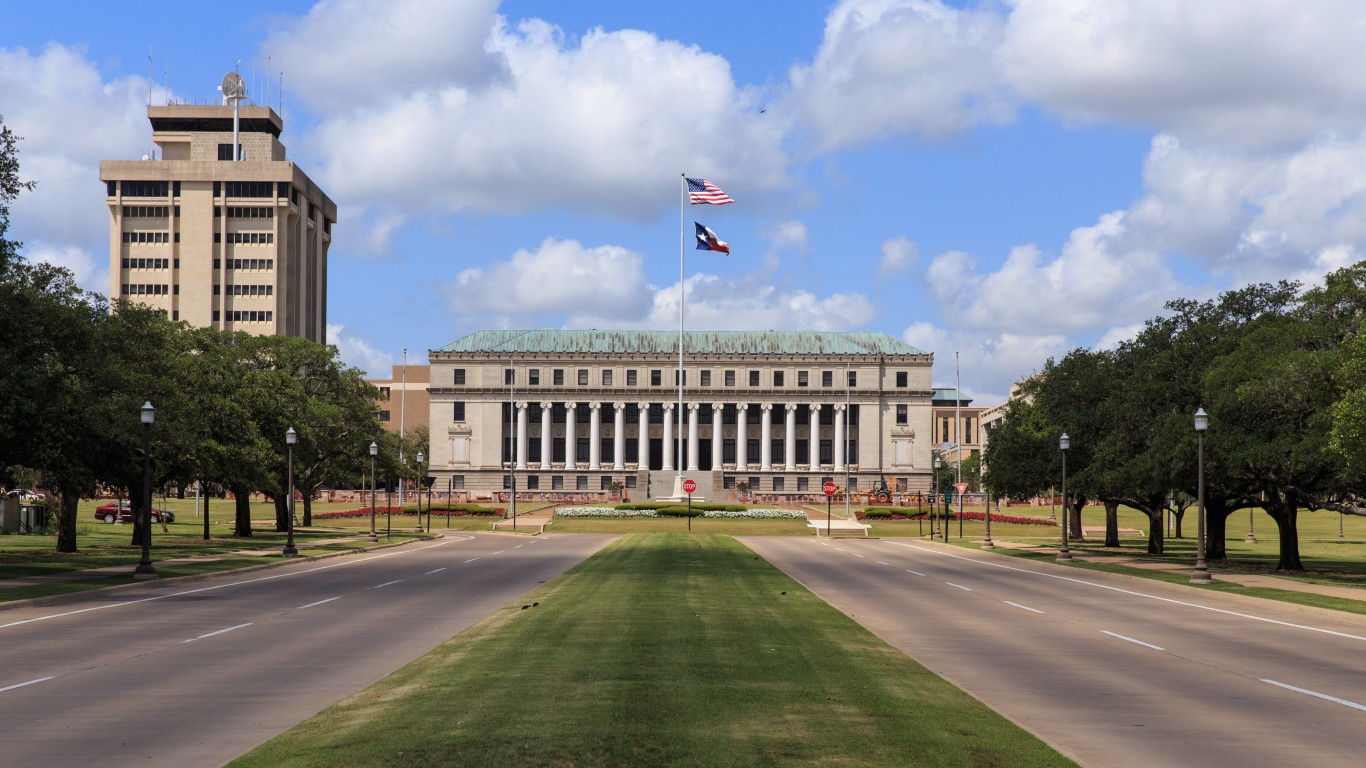
49. College Station, Texas
> 2018 violent crime rate: 203.3 per 100,000 people
> 2018 homicides: 1
> Poverty rate: 31.8%
> 2018 unemployment rate: 2.9%
College Station is a small city that is home to the main campus of Texas A&M University. Of the four classifications of violent crime — rape, robbery, homicide, and aggravated assault — rape is the only one with a higher than typical incidence rate in College Station. There were 65 reported rapes for every 100,000 people in the city, compared to about 43 per 100,000 nationwide.
Meanwhile, the murder rate in College Station is less than 1 per 100,000, well below the national rate of 5 per 100,000. Similarly, the robbery rate of 26 per 100,000 in the city is less than one-third the comparable national rate, and the aggravated assault rate of 112 per 100,000 is less than half the national rate.
48. Clovis, California
> 2018 violent crime rate: 197.7 per 100,000 people
> 2018 homicides: 1
> Poverty rate: 12.7%
> 2018 unemployment rate: 3.9%
Clovis, a small city in central California, is one of only 48 cities with fewer than 200 violent crimes reported for every 100,000 people. The city’s rape rate of 41 incidents per 100,000 people is in line with the national rate, while robbereries and aggravated assaults are less than half as common than they are nationwide. Similarly, the city’s murder rate is less than one-fifth the national murder rate of 5 per 100,000.
More often than not, safe cities are relatively affluent. In Clovis, the typical household earns $68,682 a year, about $11,000 more than the typical American household.

47. Rochester, Minnesota
> 2018 violent crime rate: 194.0 per 100,000 people
> 2018 homicides: 5
> Poverty rate: 10.4%
> 2018 unemployment rate: 2.2%
Rochester is the safest city in Minnesota and one of the safest nationwide. There were 194 violent crimes for every 100,000 people in the city in 2018. For reference, there were about 627 violent crimes for every 100,000 in St. Paul — the second safest city in the state.
Crime rates tend to be lower in cities with better economic opportunities, and in Rochester, there are jobs available for nearly everyone who wants one. The city’s annual unemployment rate is just 2.2%, well below the 3.9% national unemployment rate.
[in-text-ad-2]

46. Henderson, Nevada
> 2018 violent crime rate: 188.3 per 100,000 people
> 2018 homicides: 15
> Poverty rate: 9.1%
> 2018 unemployment rate: 4.4%
Henderson is the only city in Nevada with a population of at least 100,000 with a violent crime rate below the national rate of 369 incidents per 100,000 people. By far the safest city in the state, Henderson has an annual violent crime rate of 188 incidents per 100,000 residents. The next safest city in Nevada is Sparks, with a violent crime rate of 496 incidents per 100,000 people.
Cities with low rates of violent crime tend to have better economic opportunities and smaller shares of the population that are struggling financially. Henderson is the only city reviewed in Nevada where fewer than one in every 10 residents live below the poverty line.

45. Torrance, California
> 2018 violent crime rate: 181.7 per 100,000 people
> 2018 homicides: 2
> Poverty rate: 7.2%
> 2018 unemployment rate: 3.8%
A small city of 147,000 located about 15 miles south of Los Angeles, Torrance is one of 14 cities in California to rank among the safest nationwide. There were only 182 violent crimes in Torrance for every 100,000 people in 2018, half the national violent crime rate of 369 incidents per 100,000 people.
Property crimes — another broad FBI classification that includes infractions like motor vehicle theft, burglary, and larceny — are also relatively rare in Torrance. There were just 1,838 property crimes reported for every 100,000 people in the city in 2018, well below the national rate of 2,200 per 100,00.
[in-text-ad]
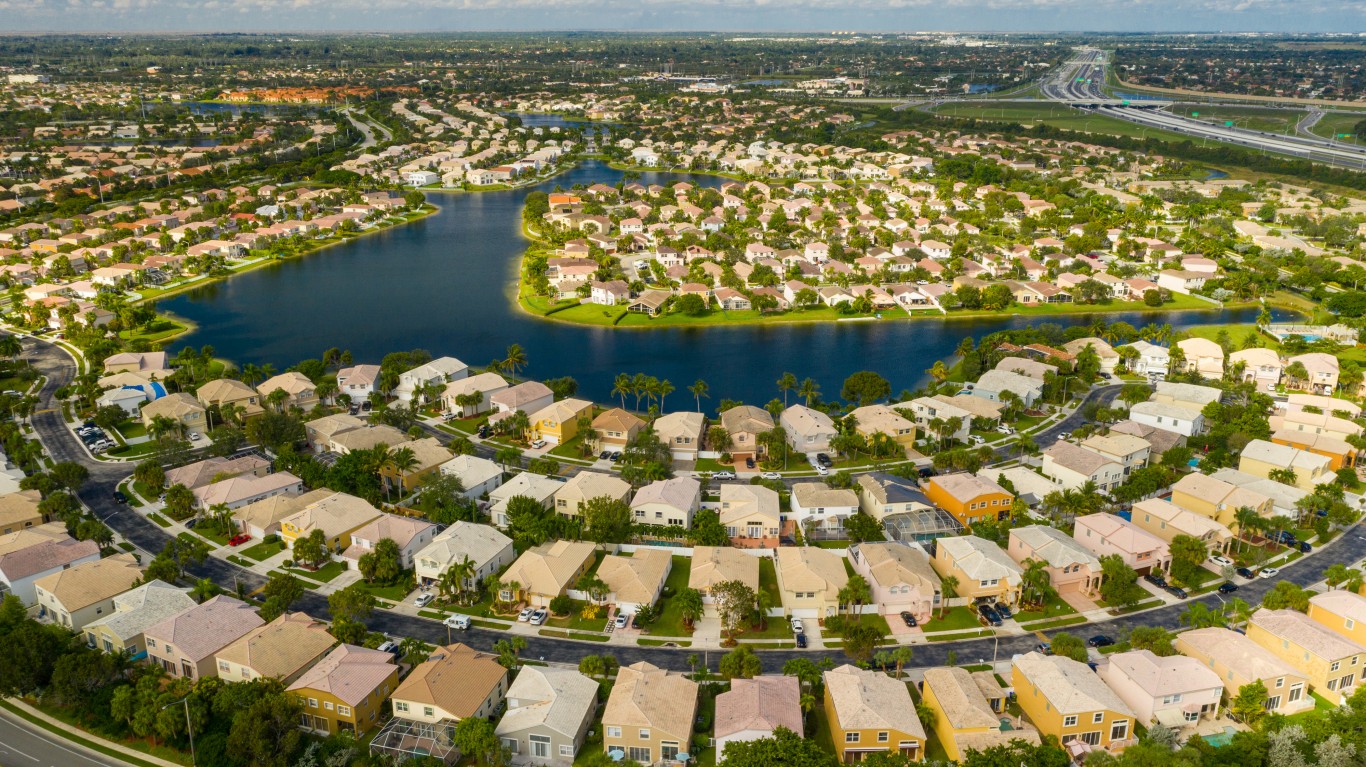
44. Pembroke Pines, Florida
> 2018 violent crime rate: 181.4 per 100,000 people
> 2018 homicides: 1
> Poverty rate: 8.4%
> 2018 unemployment rate: 3.1%
Pembroke Pines has one of the lowest murder rates of any U.S. city home to at least 100,000 people. There was only one homicide in the southeastern Florida city in 2018, or 0.6 murders for every 100,000 people. Nationwide, the annual murder rate stands at 5 homicides per 100,000 people. Including other crimes like aggravated assault and robbery, the overall violent crime rate in the city is just 181 per 100,000 people, about half the national rate of 369 per 100,000.
Like most other safe U.S. cities, the vast majority of those living in Pembroke Pines are financially secure. The city’s 8.4% poverty rate is well below the comparable 14.6% national rate.
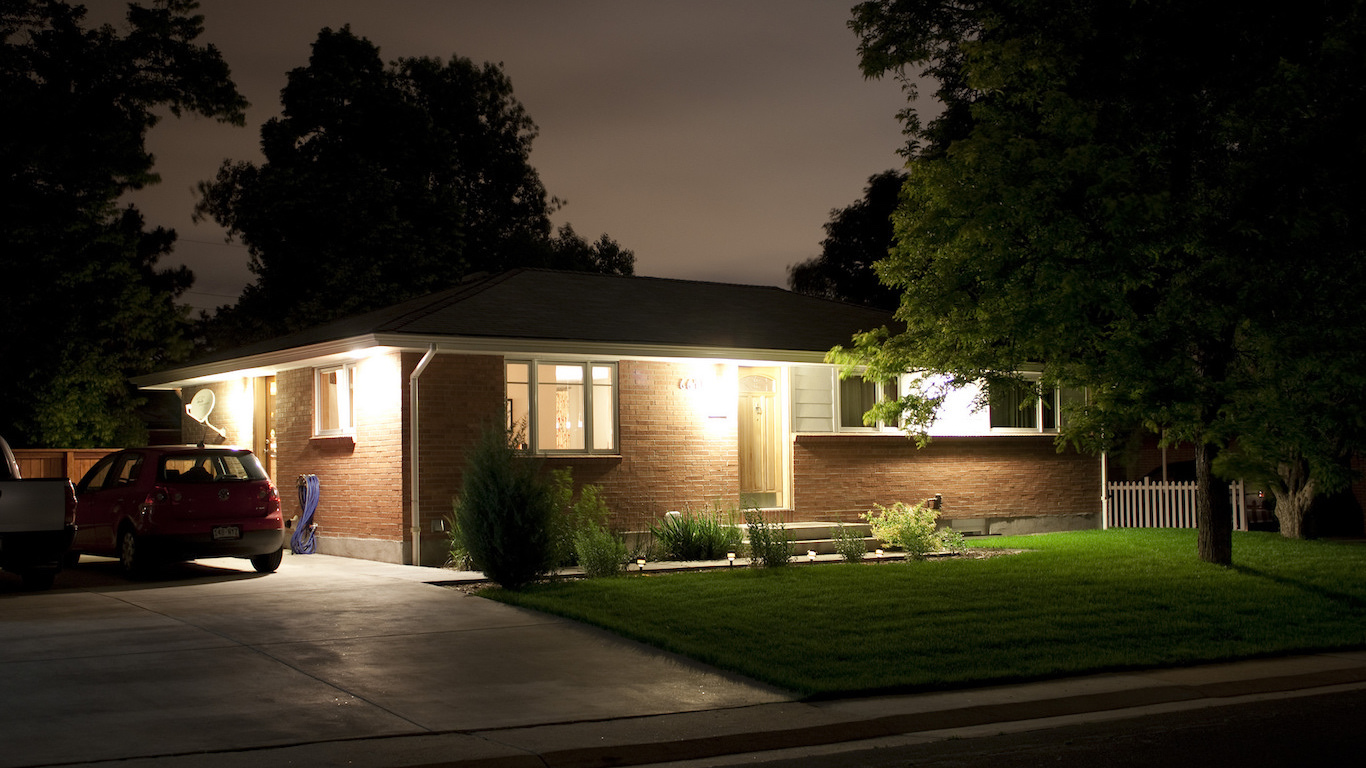
43. Centennial, Colorado
> 2018 violent crime rate: 180.9 per 100,000 people
> 2018 homicides: 2
> Poverty rate: 4.3%
> 2018 unemployment rate: 2.8%
There were only 181 violent crimes for every 100,000 people in Centennial, Colorado, a small city just southeast of Denver. Non-violent crimes like motor vehicle theft and burglary are also not especially common in the city. There were 1,754 property crimes for every 100,000 people in 2018, well below the national property crime rate of 2,200 per 100,000.
Wealthier cities tend to be relatively safe, and Centennial is one of the wealthiest cities in the country. Over half of all households in the city have an income of over $100,000 a year, well above the median household income nationwide of $57,652.

42. Sterling Heights, Michigan
> 2018 violent crime rate: 180.4 per 100,000 people
> 2018 homicides: 2
> Poverty rate: 12.0%
> 2018 unemployment rate: 3.8%
The eastern Michigan city of Sterling Heights is the only city in the state to rank among the safest in the country. There were only 180 violent crimes for every 100,000 people in the city in 2018 — a stark contrast to Detroit, located roughly 20 miles to the south, and its nation-leading violent crime rate of 2,008 incidents per 100,000 people.
Economic opportunities appear to be much more widely available in Sterling Heights than in Detroit. The 2018 unemployment in Sterling Heights was just 3.8%, while it was 9.0% in Detroit.
[in-text-ad-2]
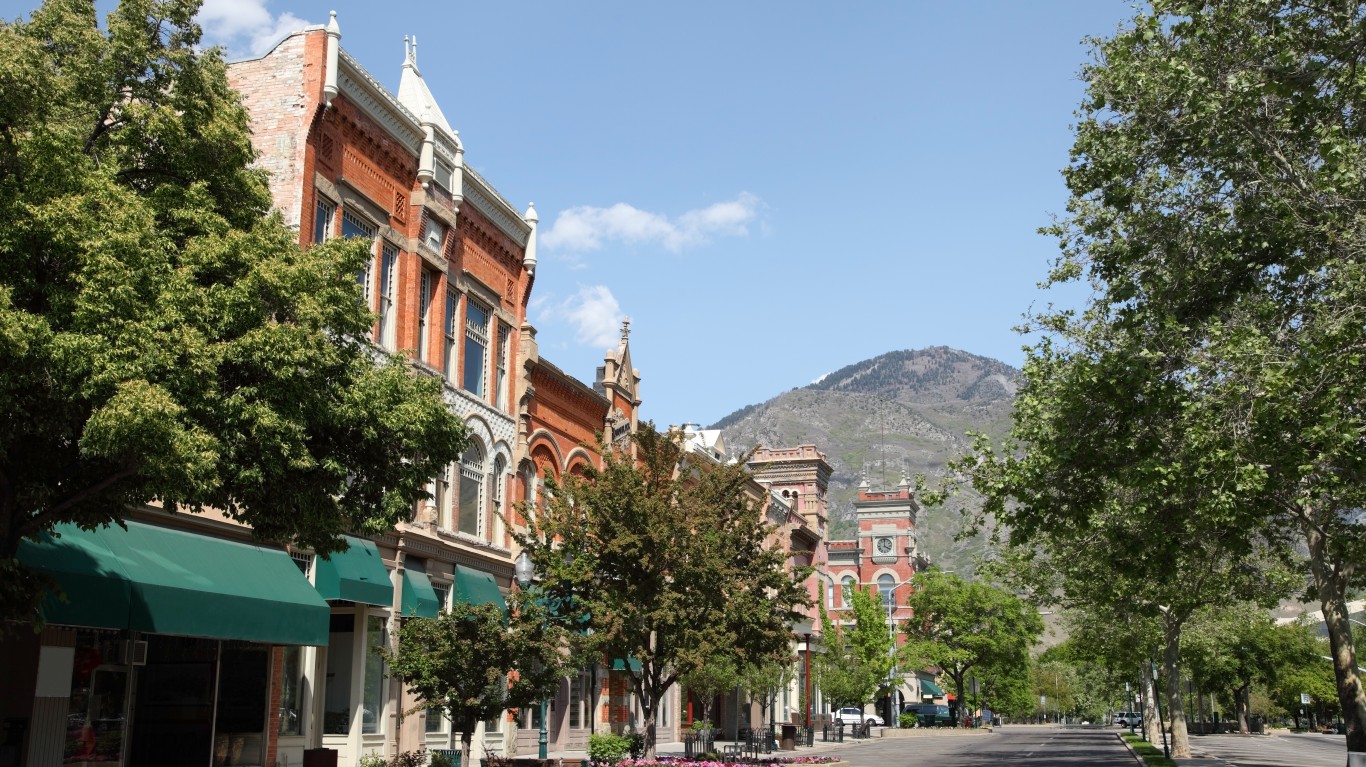
41. Provo, Utah
> 2018 violent crime rate: 175.4 per 100,000 people
> 2018 homicides: 2
> Poverty rate: 25.4%
> 2018 unemployment rate: 2.7%
Home to Brigham Young University, Provo, Utah, is one of several college towns to rank among the safest cities in the country. There were only 175 violent crimes for every 100,000 people in the city in 2018, by far the lowest rate of any city with a population of at least 100,000 in Utah and well below the 369 per 100,000 national rate.
Robbery, a component of violent crime, is especially uncommon in Provo. Just 22 robberies were reported in the city in 2018 — or 19 robberies for every 100,000 people, a fraction of the national robbery rate of 86 per 100,000.

40. Simi Valley, California
> 2018 violent crime rate: 168.2 per 100,000 people
> 2018 homicides: 0
> Poverty rate: 6.2%
> 2018 unemployment rate: 3.1%
Simi Valley is a small city of 127,000 about 35 miles northwest of Los Angeles. The city was one of 19 mid- to large-size cities nationwide with no criminal homicides reported in all of 2018. Other crimes like aggravated assault and robbery are also relatively uncommon in the city, and overall, there were only 168 violent crimes for every 100,000 people in Simi Valley in 2018.
Simi Valley also has one of the lowest property crime rates of any U.S. city tracked by the FBI. There were only 1,172 property crimes like motor vehicle theft and burglary for every 100,000 people in 2018, nearly half the national property crime rate of 2,200 per 100,000.
[in-text-ad]

39. Scottsdale, Arizona
> 2018 violent crime rate: 165.5 per 100,000 people
> 2018 homicides: 7
> Poverty rate: 8.9%
> 2018 unemployment rate: 3.5%
Scottsdale is one of three Arizona cities to rank among the safest cities in the United States. There were only 166 violent crimes reported for every 100,000 people in 2018, less than half the national violent crime rate of 369 per 100,000.
Like in many of the safest cities, Scottsdale residents are relatively wealthy. The typical Scottsdale household earns $80,306 a year, far more than the national median household income of $57,652. Similarly, just 8.9% of residents live in poverty, compared to the 14.6% national poverty rate.

38. Stamford, Connecticut
> 2018 violent crime rate: 165.1 per 100,000 people
> 2018 homicides: 3
> Poverty rate: 9.3%
> 2018 unemployment rate: 3.7%
Stamford, Connecticut, is the safest city of 100,000 or more residents in Connecticut and the broader New England region. There were 165 violent crimes reported for every 100,000 people in the city in 2018, well below the 369 per 100,000 national violent crime rate. Meanwhile, New Haven, located about 40 miles east of Stamford, is one of the most dangerous cities in the country, with a violent crime rate of 842 incidents per 100,000 people.
As is often the case in the safest American cities, Stamford is growing rapidly. In the last decade, the number of people living in the city climbed from 119,500 to 132,000, a 10.5% increase. Over the same period, the total U.S. population grew by 6.6%.
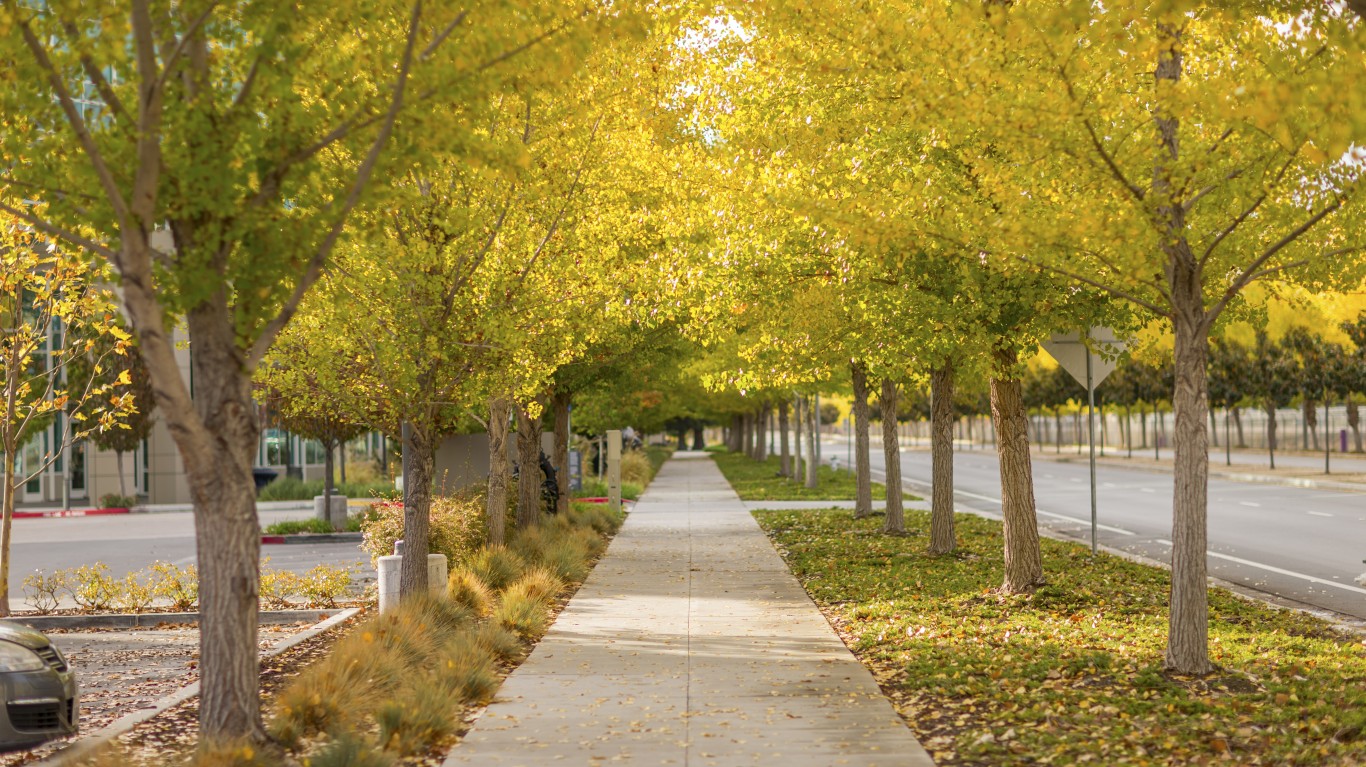
37. Sunnyvale, California
> 2018 violent crime rate: 163.8 per 100,000 people
> 2018 homicides: 1
> Poverty rate: 6.6%
> 2018 unemployment rate: 2.2%
Sunnyvale is a city of about 156,000 in California’s Silicon Valley area. There were just 164 violent crimes reported for every 100,000 people in the city in 2018, less than half the 369 per 100,000 national violent crime rate.
Wealthier cities with plenty of economic opportunity tend to be safer, on average, than other parts of the country. In Sunnyvale, most households have an income of over $118,000 a year, more than double the national median household income, and the annual unemployment is just 2.2%, well below the 3.9% national rate. Safe streets and a strong economy may explain the city’s rapid population growth. Over the last decade, the number of people living in Sunnyvale spiked by 17.8%, well more than double the national population growth of 6.6% over the same period.
[in-text-ad-2]
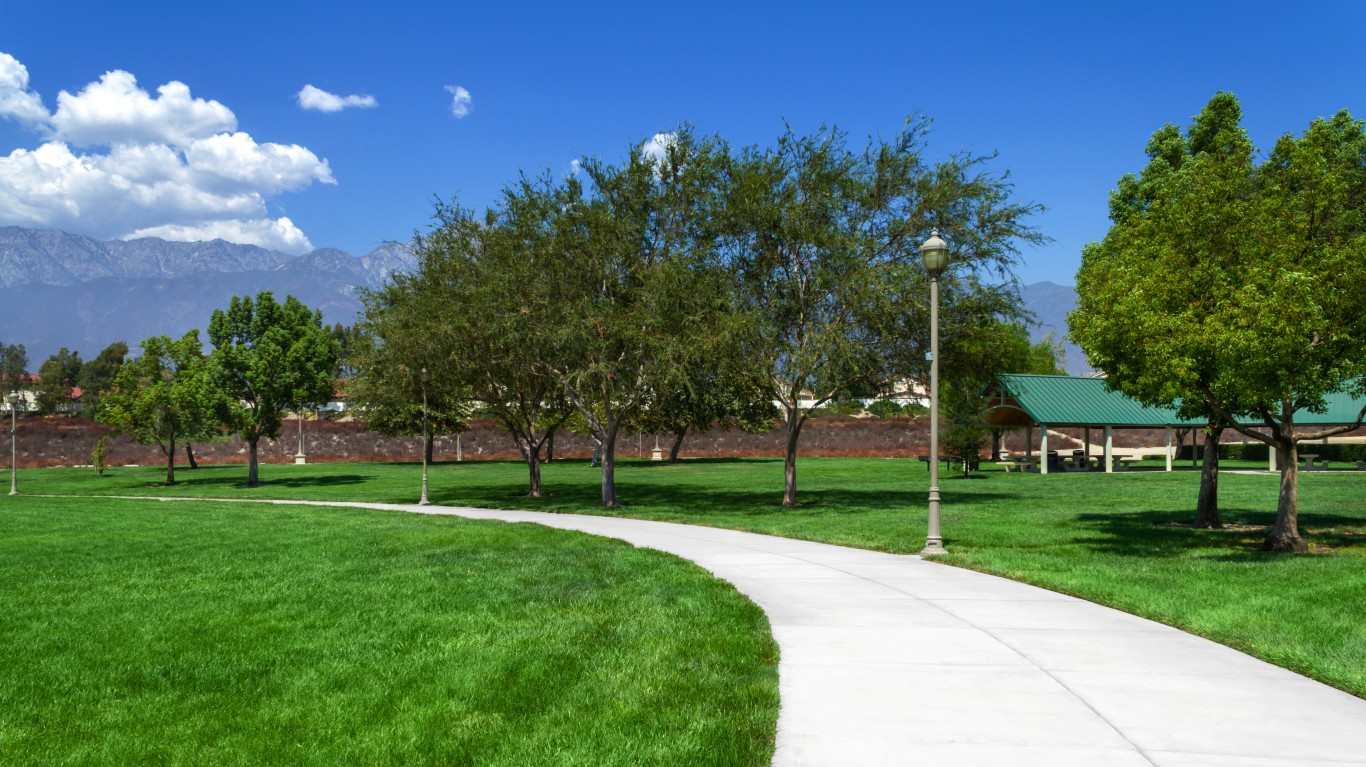
36. Rancho Cucamonga, California
> 2018 violent crime rate: 161.9 per 100,000 people
> 2018 homicides: 1
> Poverty rate: 8.4%
> 2018 unemployment rate: 3.1%
Rancho Cucamonga’s violent crime rate of 162 incidents per 100,000 is among the lowest of any mid- to large-sized American city. As is typical of safer American cities, joblessness and financial hardship are not common in Rancho Cucamonga. Just 3.1% of area workers were unemployed in 2018, and 8.4% of the population live below the poverty line — compared to the 3.9% national unemployment rate and the 14.6% national poverty rate.
Rancho Cucamonga is located just 20 miles east of San Bernardino, one of the most dangerous cities in the United States. There were 1,333 violent crimes for every 100,000 people in San Bernardino in 2018, more than three times the national violent crime rate of 369 per 100,000.

35. Santa Clara, California
> 2018 violent crime rate: 161.6 per 100,000 people
> 2018 homicides: 1
> Poverty rate: 7.7%
> 2018 unemployment rate: 2.4%
Located in the Silicon Valley area, Santa Clara is one of several California cities on this list. One of the wealthiest parts of the country, Santa Clara’s median annual household income is $108,609, well above the $57,652 national median. Wealthy areas tend to have lower crime rates on average, and in Santa Clara, there were just 162 violent crimes for every 100,000 people, well below the 369 per 100,000 national rate.
While violent crimes are relatively rare in Santa Clara, property crimes like larceny and motor vehicle theft are not. There were 2,907 property crimes for every 100,000 people in the city in 2018, compared to a much lower national property crime rate of 2,200 per 100,000.
[in-text-ad]
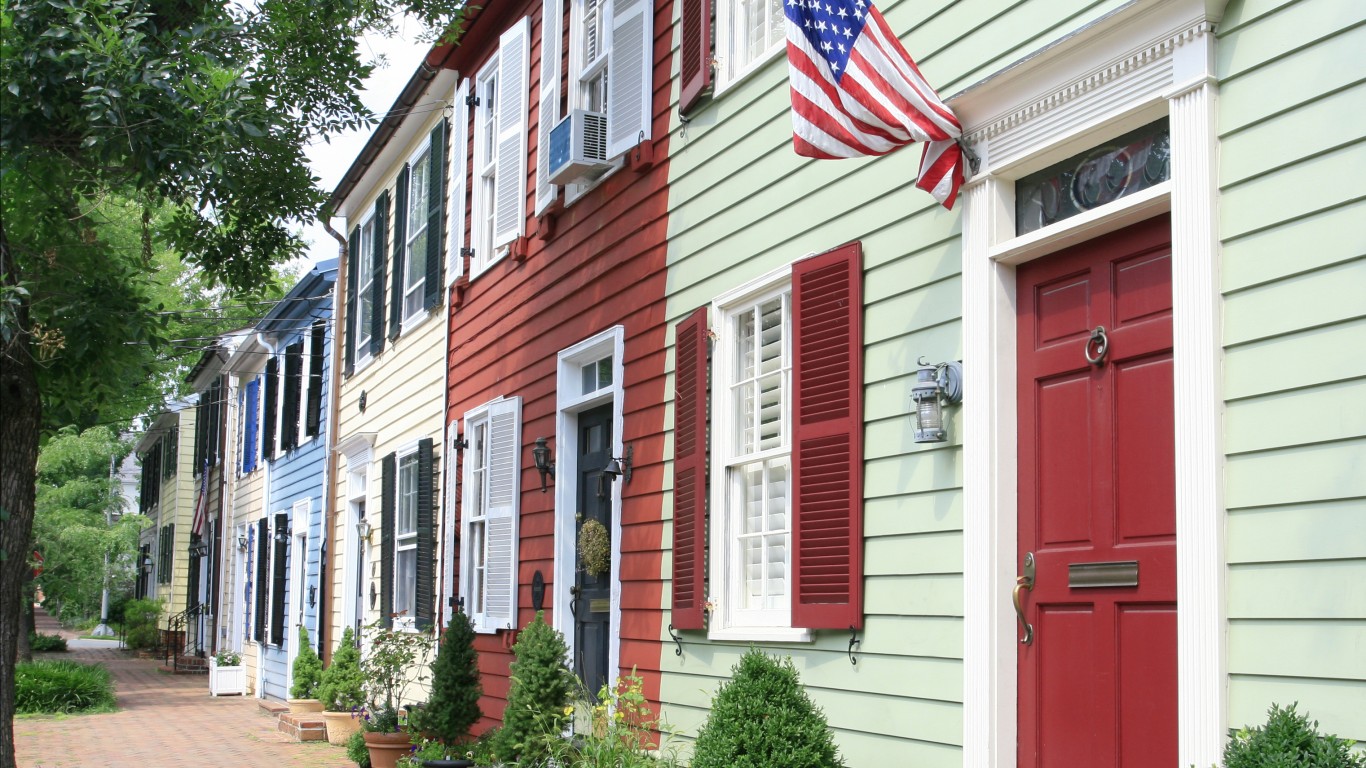
34. Alexandria, Virginia
> 2018 violent crime rate: 159.9 per 100,000 people
> 2018 homicides: 4
> Poverty rate: 10.5%
> 2018 unemployment rate: 2.2%
Alexandria is an independent city of approximately 163,000 residents located in the Washington, D.C. metro area. While there were 941 violent crimes reported per 100,000 residents in Washington, D.C. in 2018 — more than twice the national violent crime rate — Alexandria is one of the safest cities in the country. There were just 160 violent crimes reported per 100,000 Alexandria residents in 2018, compared to the national rate of 369 incidents per 100,000 Americans.
While the relationship between wealth and crime is complicated, wealthier areas tend to have lower crime rates. In Alexandria, the typical household earns $93,370 a year, about $36,000 more than the national median household income. Similarly, just 2.2% of the Alexandria labor force is unemployed, far less than the 3.9% national unemployment rate.
33. Meridian, Idaho
> 2018 violent crime rate: 159.0 per 100,000 people
> 2018 homicides: 2
> Poverty rate: 9.8%
> 2018 unemployment rate: 2.5%
According to the most recent FBI data, there were two murders, 42 rapes, 14 robberies, and 107 aggravated assaults reported per 100,000 residents in Meridian in 2018. Adjusted for population, there were just 159 violent crimes reported per 100,000 residents, the least of any midsize or large city in Idaho and less than half the national rate of 369 incidents per 100,000 Americans.
The low prevalence of crime may be a pull factor for the new residents moving to Meridian. From 2009 to 2018, the population of Meridian grew by 45.0%, nearly seven times the 6.6% national growth rate and among the highest growth rates of any city nationwide.

32. Coral Springs, Florida
> 2018 violent crime rate: 155.2 per 100,000 people
> 2018 homicides: 1
> Poverty rate: 10.0%
> 2018 unemployment rate: 3.3%
Coral Springs is a city of approximately 135,000 residents in Broward County located about 50 miles north of Miami. In 2018, there were 155 murders, rapes, robberies, and aggravated assaults reported in Coral Springs, less than half the national violent crime rate of 369 incidents per 100,000 Americans and the third least of any city in Florida with a population of at least 100,000.
One factor that may account for the lower violent crime rate in Coral Springs is the high area incomes. Crime is disproportionately concentrated in low-income areas and Coral Springs is one of the wealthier midsize cities in both Florida and the U.S. as a whole. The typical Coral Springs household earns $70,768 a year, far more than the national median household income of $57,652.
[in-text-ad-2]
31. Corona, California
> 2018 violent crime rate: 154.7 per 100,000 people
> 2018 homicides: 6
> Poverty rate: 11.6%
> 2018 unemployment rate: 3.3%
Corona is one of several cities in Riverside County to rank among the safest in the country. In 2018, there were 155 violent crimes reported per 100,000 residents in the city, far less than the national violent crime rate of 369 incidents per 100,000 Americans.
Crime is disproportionately concentrated in low-income neighborhoods, and many of the safest cities in the United States are among the wealthiest. In Corona, the typical household earns $73,594 a year, nearly $16,000 more than the national median household income. Some 11.6% of residents live in poverty, compared to the 14.6% national poverty rate.
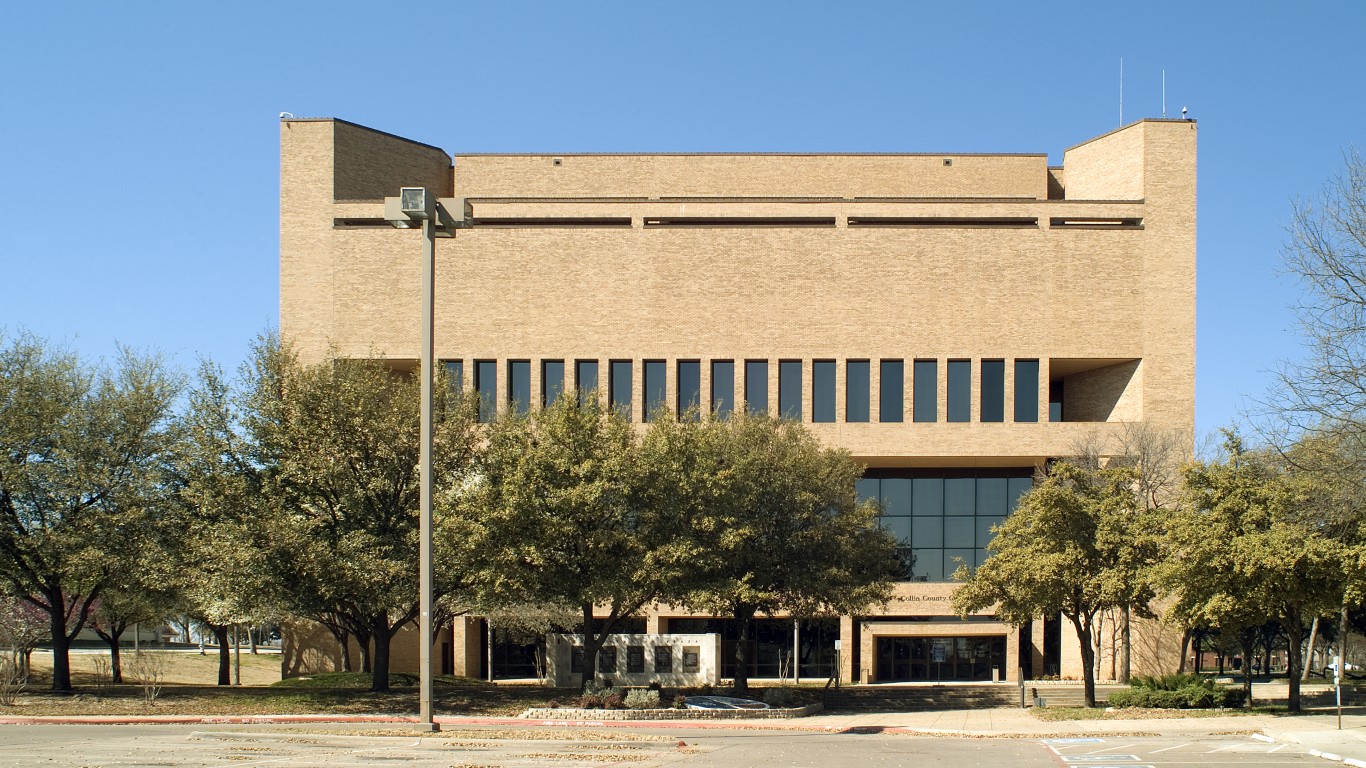
30. McKinney, Texas
> 2018 violent crime rate: 151.9 per 100,000 people
> 2018 homicides: 0
> Poverty rate: 7.0%
> 2018 unemployment rate: 3.5%
McKinney is a suburb of approximately 132,000 residents located about 30 miles north of downtown Dallas. While Dallas is one of the more dangerous cities in the country — there were 765 murders, rapes, robberies, and aggravated assaults reported per 100,000 residents in 2018, more than twice the national violent crime rate — McKinney is one of the safest cities in the country. There were just 152 violent crimes reported per 100,000 residents in McKinney, less than half the national violent crime rate of 369 incidents per 100,000 Americans.
Crime tends to be less concentrated in more affluent areas. In McKinney, the typical household earns $87,608, well above the national median of $57,652 — which itself is far more than the median household income of $47,285 in Tulsa.
[in-text-ad]

29. Broken Arrow, Oklahoma
> 2018 violent crime rate: 142.3 per 100,000 people
> 2018 homicides: 3
> Poverty rate: 7.6%
> 2018 unemployment rate: 3.0%
Broken Arrow is a small city of approximately 110,000 residents located about 15 miles southeast of Tulsa. While there were 1,065 violent crimes reported per 100,000 residents in Tulsa in 2018 — nearly three times the national violent crime rate — Broken Arrow is one of the safest cities in the country. There were 142 murders, rapes, robberies, and aggravated assaults reported per 100,000 residents in Broken Arrow in 2018, less than half the national violent crime rate of 369 incidents per 100,000 Americans and the least of any city in Oklahoma.
Crime tends to be less concentrated in more affluent areas. In Broken Arrow, the typical household earns $70,788, well above the national median of $57,652 — which itself is far more than the median household income of $44,577 in Tulsa.
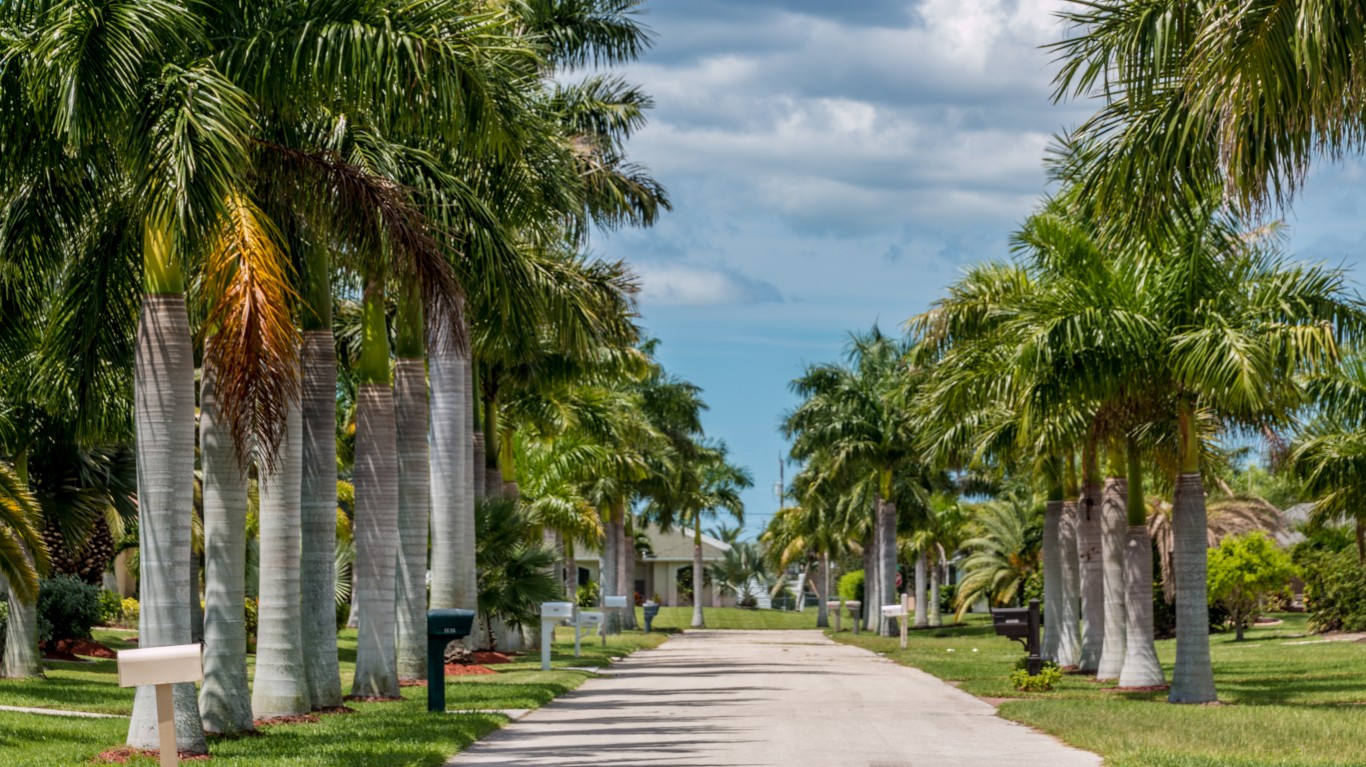
28. Cape Coral, Florida
> 2018 violent crime rate: 142.1 per 100,000 people
> 2018 homicides: 3
> Poverty rate: 12.7%
> 2018 unemployment rate: 3.4%
Cape Coral is a seaside city on the Gulf Coast of Florida with a network of over 400 miles of canals. Developed as a planned community, the city grew from about 200 residents in 1960 to approximately 188,000 today. It is the second safest midsize to large city in Florida and the 28th safest nationwide, with a violent crime rate of just 142 incidents per 100,000 residents.
While income is one of the main correlates of violent crime, and wealthier cities tend to be less dangerous, the median household income in Cape Coral is lower than the U.S. figure. The typical Cape Coral household earns $53,653 a year, less than the national median household income of $57,652.
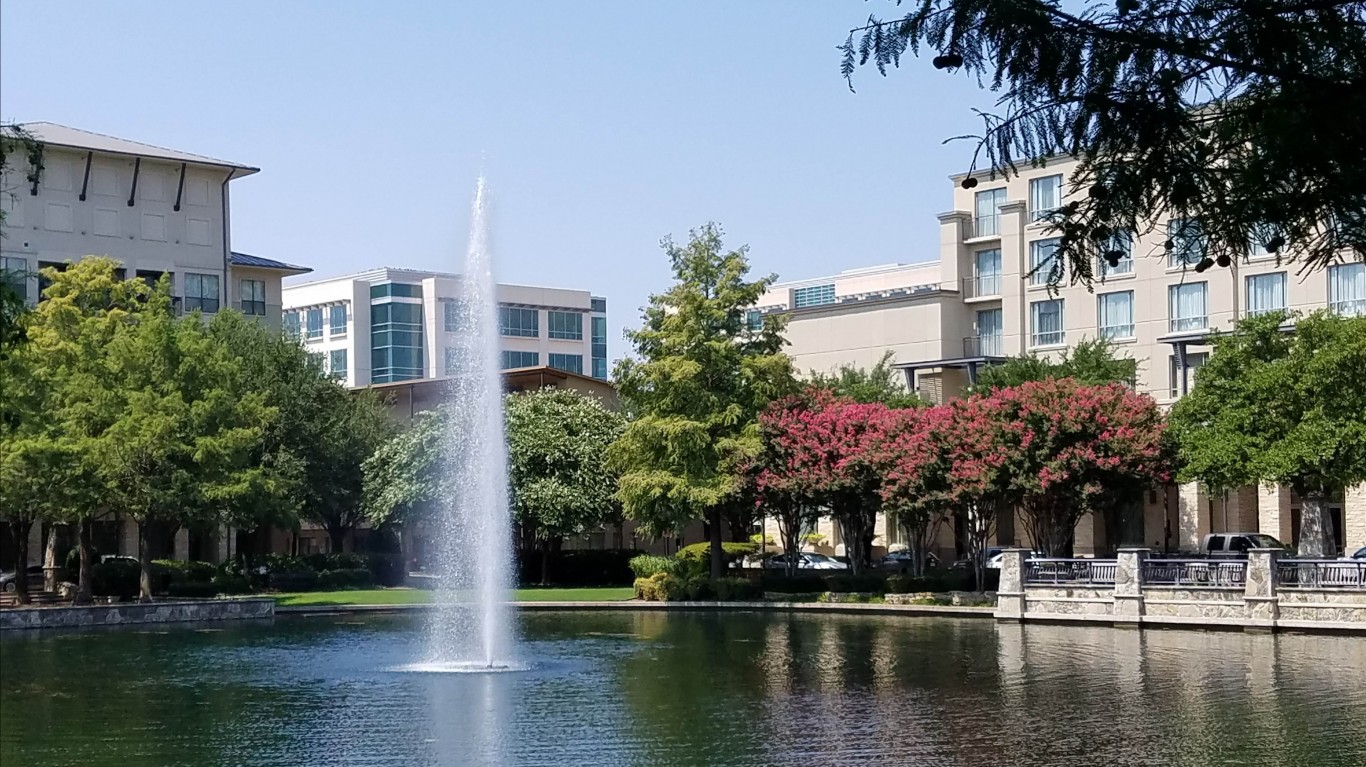
27. Plano, Texas
> 2018 violent crime rate: 138.7 per 100,000 people
> 2018 homicides: 5
> Poverty rate: 7.0%
> 2018 unemployment rate: 3.3%
The typical household in Plano, a suburb of the Dallas metro area of approximately 290,000 residents, earns $88,578 a year. This is over $30,000 more than the U.S. median household income and the 21st highest income of any U.S. city with at least 100,000 residents. While the relationship between wealth and crime is complicated, wealthier cities tend to have a lower incidence of violent crime.
There were 139 violent crimes reported per 100,000 residents in Plano in 2018, the ninth lowest crime rate among midsize to large cities in Texas and the 27th lowest nationwide. By comparison, there were 369 violent crimes per 100,000 Americans nationwide in 2018.
[in-text-ad-2]
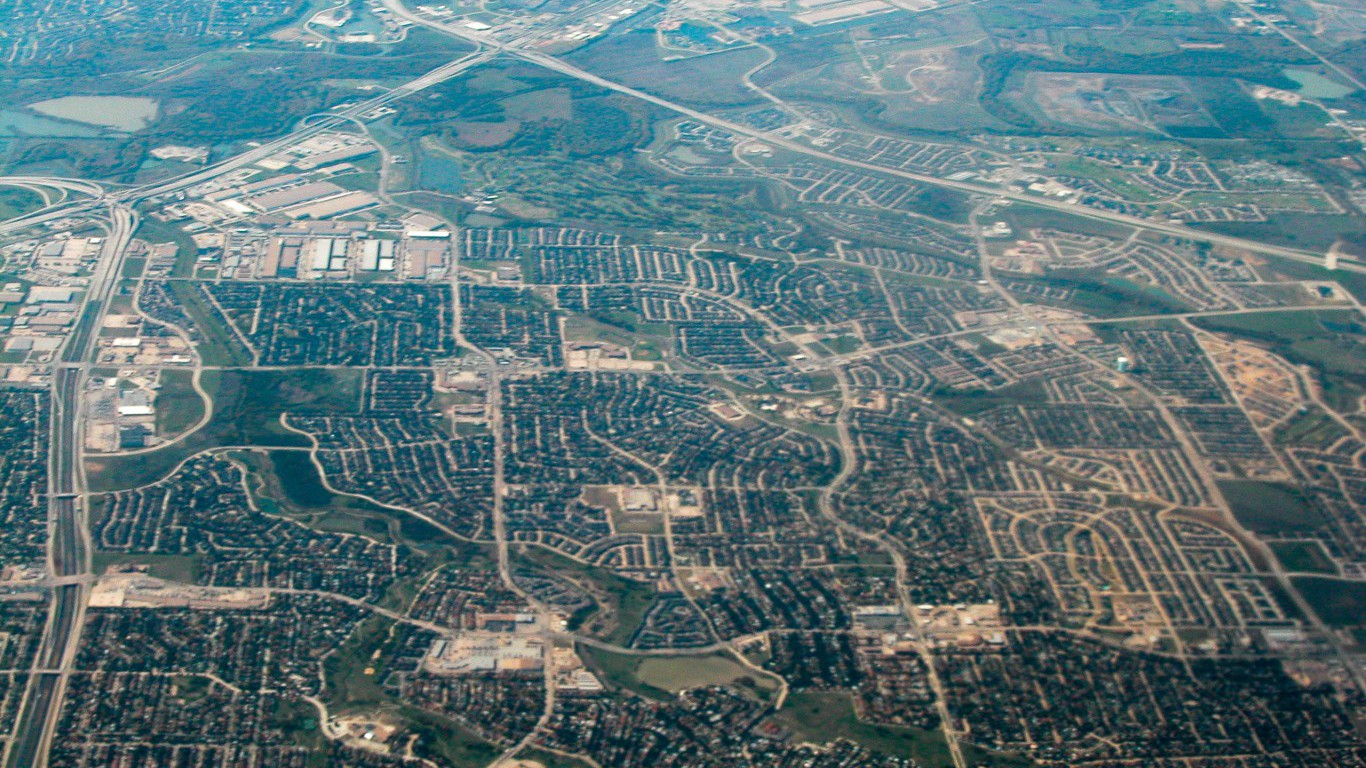
26. Carrollton, Texas
> 2018 violent crime rate: 138.2 per 100,000 people
> 2018 homicides: 5
> Poverty rate: 10.1%
> 2018 unemployment rate: 3.2%
Carrollton is one of several suburbs in the Dallas metro area to rank among the safest cities in America. In 2018, there were just 138 violent crimes reported per 100,000 residents in the city, less than half the national crime rate of 369 incidents per 100,000 Americans. Additionally, there were 1,710 property crimes, which include burglary, larceny, and motor vehicle theft, per 100,000 city residents, compared to the national property crime rate of 2,200 per 100,000.
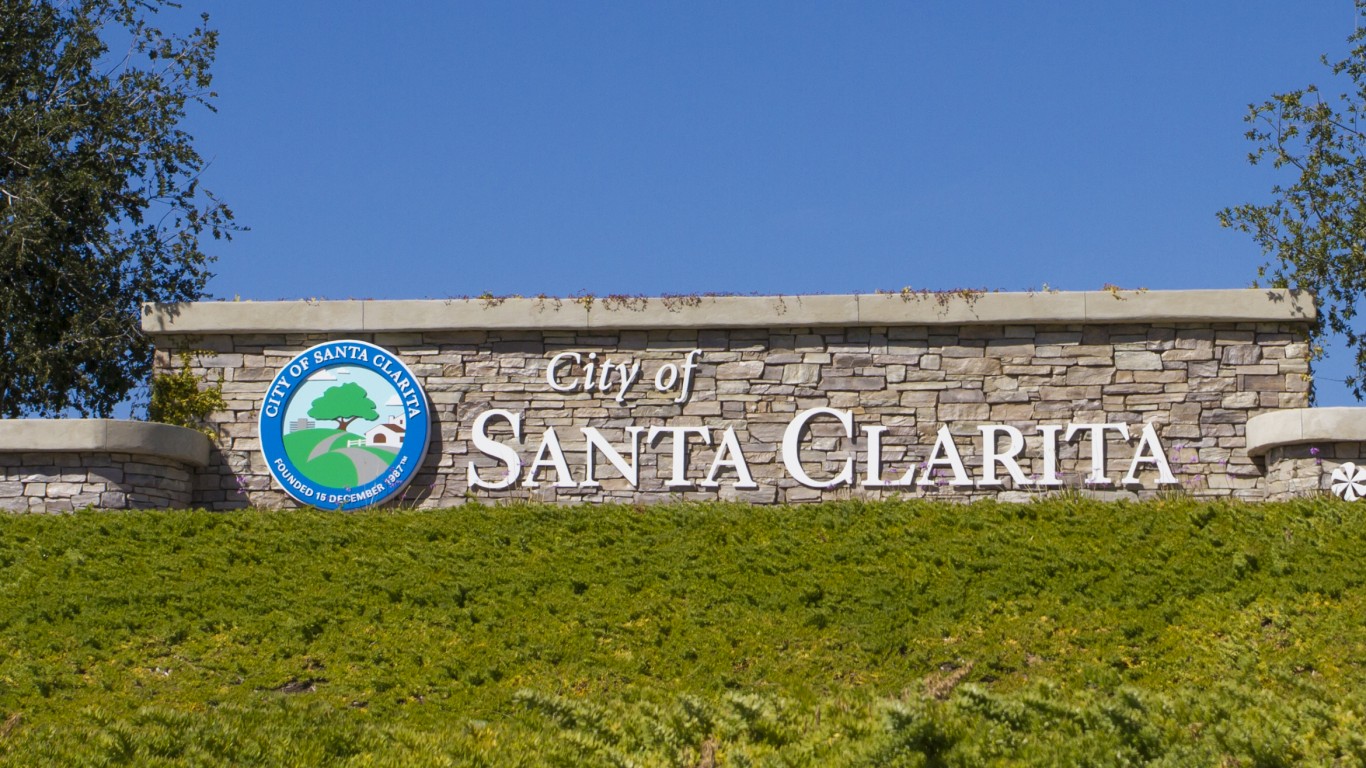
25. Santa Clarita, California
> 2018 violent crime rate: 134.8 per 100,000 people
> 2018 homicides: 4
> Poverty rate: 8.8%
> 2018 unemployment rate: 4.3%
Santa Clarita is a Los Angeles suburb of approximately 217,000 residents. The typical household in Santa Clarita earns $90,544 a year, approximately $33,000 more than the U.S. median and one of the most of any city with at least 100,000 residents nationwide.
While the relationship between income and crime is complicated, wealthier areas tend to have lower incidence of violent crime than poor areas. In Santa Clarita, there were just 135 violent crimes reported per 100,000 residents in 2018, far less than the corresponding national rate of 369 violent crimes per 100,000 Americans.
[in-text-ad]
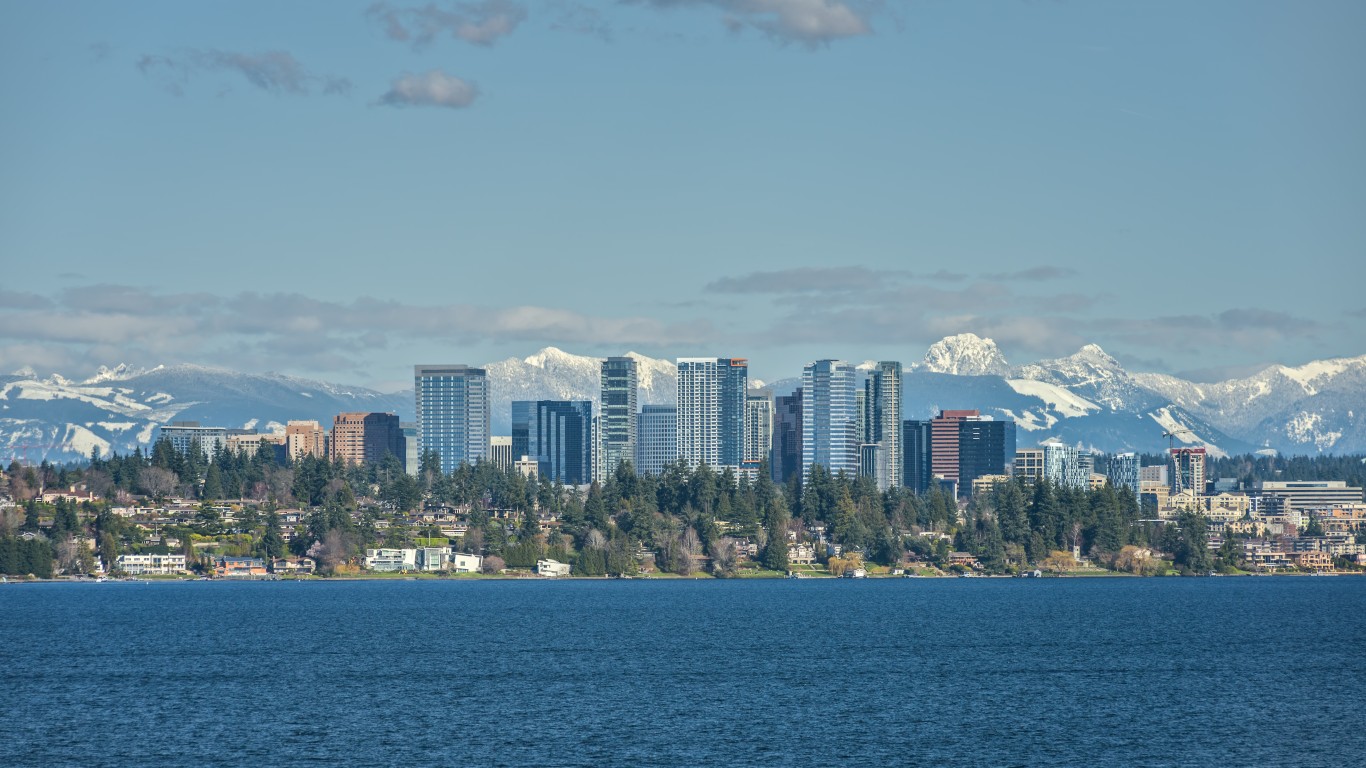
24. Bellevue, Washington
> 2018 violent crime rate: 132.1 per 100,000 people
> 2018 homicides: 0
> Poverty rate: 7.4%
> 2018 unemployment rate: 3.2%
According to the most recent data from the FBI, there were zero murders, 27 rapes, 82 robberies, and 85 aggravated assaults reported in Bellevue in 2018. Adjusted for population, there were 132 violent crimes per 100,000 residents, the least of any city in Washington state and far less than the national violent crime rate of 369 per 100,000.
While Bellevue has one of the lowest violent crime rates nationwide, property crime is more common in the Seattle area suburb than in a majority of midsize to large U.S. cities. In 2018, there were 2,923 burglaries, larceny-thefts, and motor vehicle thefts reported per 100,000 residents in Bellevue, compared to the national rate of 2,200 property crimes per 100,000 Americans.

23. Lakewood Township, New Jersey
> 2018 violent crime rate: 125.3 per 100,000 people
> 2018 homicides: 0
> Poverty rate: N/A
> 2018 unemployment rate: N/A
Lakewood is a township of approximately 103,000 residents located in Ocean County, New Jersey. One of the safest cities in the country, there were just 125 violent crimes reported per 100,000 city residents in 2018. By comparison, nationwide some 369 violent crimes per 100,000 Americans were reported in 2018. Similarly, there were just 757 burglaries, larceny-thefts, and motor vehicle thefts reported per 100,000 Lakewood residents in 2018, the lowest property crime rate of any U.S. city of 100,000 people or more and about one-third the national property crime rate of 2,200 per 100,000.

22. Round Rock, Texas
> 2018 violent crime rate: 120.9 per 100,000 people
> 2018 homicides: 1
> Poverty rate: 8.2%
> 2018 unemployment rate: 2.9%
Round Rock is a suburb of the Austin metro area of approximately 127,000 residents. In 2018, there were just 121 violent crimes reported per 100,000 Round Rock residents, about one-third of the national violent crime rate of 369 incidents per 100,000 Americans.
While the relationship between wealth and crime is complicated, areas with lower poverty and unemployment rates tend to have less violent crime. In Round Rock, just 8.2% of residents live in poverty, far less than the 14.6% national poverty rate. Similarly, just 2.9% of the labor force is unemployed, compared to the national unemployment rate of 3.9%.
[in-text-ad-2]
21. Surprise, Arizona
> 2018 violent crime rate: 120.8 per 100,000 people
> 2018 homicides: 7
> Poverty rate: 9.1%
> 2018 unemployment rate: 4.7%
Located northwest of downtown Phoenix, Surprise is one of many suburbs of major cities to rank among the safest in the country. While nationwide there were 369 violent crimes reported per 100,000 Americans in 2018, in Surprise there were just 121 violent crimes reported per 100,000 residents, the second lowest rate of any mid to large sized city in Arizona and the 21st lowest nationwide.
While Surprise is less dangerous than a majority of cities, there were seven reported murders in the city in 2018, contributing to a murder rate of 5.1 per 100,000 people, in line with the national murder rate.
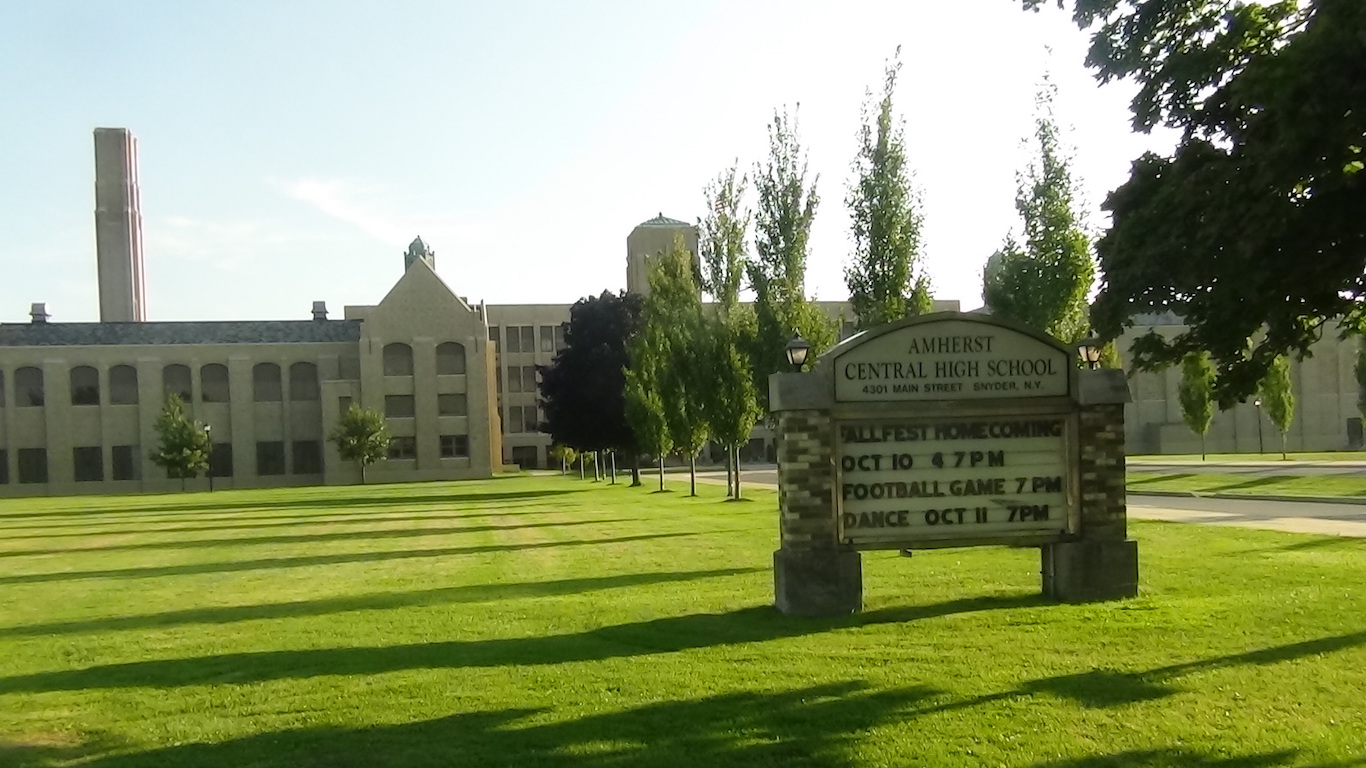
20. Amherst Town, New York
> 2018 violent crime rate: 119.5 per 100,000 people
> 2018 homicides: 0
> Poverty rate: N/A
> 2018 unemployment rate: N/A
Amherst is a suburb of approximately 121,000 residents located just outside of Buffalo. According to the FBI, there were no murders, 25 rapes, 49 robberies, and 71 aggravated assaults reported in Amherst in 2018. Adjusted for population, there were 120 violent crimes per 100,000 residents, the lowest violent crime rate of any city in New York and less than one-third the national violent crime rate of 369 per 100,000. Similarly, there were just 1,455 burglaries, larceny-thefts, and motor vehicle thefts per 100,000 residents, far less than the national property crime rate of 2,200 per 100,000.
[in-text-ad]
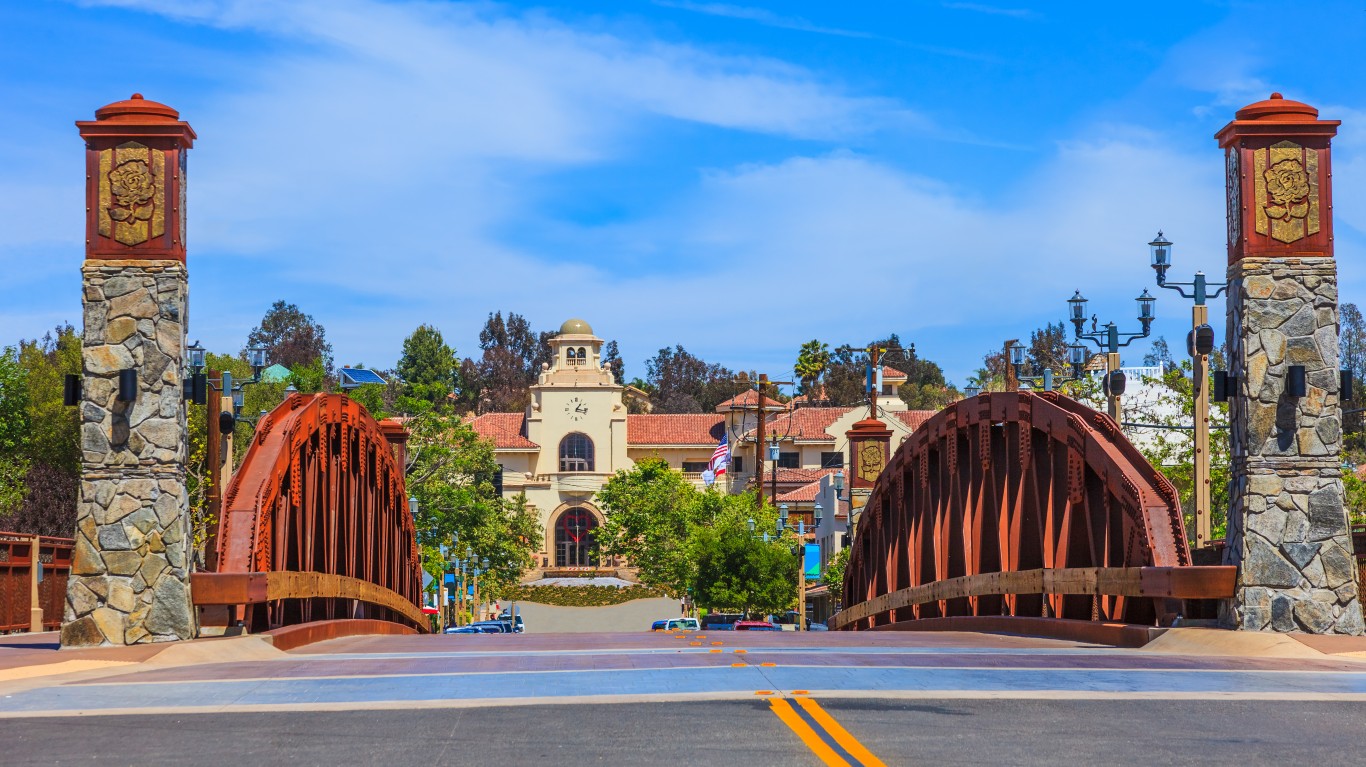
19. Temecula, California
> 2018 violent crime rate: 119.4 per 100,000 people
> 2018 homicides: 0
> Poverty rate: 6.8%
> 2018 unemployment rate: 3.5%
The typical household in Temecula earns $87,115 a year, about $29,000 more than the U.S. median annual household income. Just 6.8% of residents live in poverty, and 3.5% of the labor force is unemployed, compared to the national poverty rate of 14.6% and unemployment rate of 3.9%.
Cities with better economic conditions tend to have less violent crime. In Temecula, there were just 119 violent crimes reported per 100,000 residents in 2018, less than one-third the national violent crime rate of 369 per 100,000 and among the lowest rate of any city nationwide.

18. Edison Township, New Jersey
> 2018 violent crime rate: 118.4 per 100,000 people
> 2018 homicides: 2
> Poverty rate: N/A
> 2018 unemployment rate: N/A
Edison is one of several townships just outside of New York City to rank among the safest cities in the country. According to the most recent FBI data, there were two murders, eight rapes, 44 robberies, and 66 aggravated assaults in Edison in 2018. In total, there were 118 violent crimes per 100,000 city residents, less than one-third the national violent crime rate of 369 incidents per 100,000 Americans. Similarly, there were just 1,132 burglaries, larceny-thefts, and motor vehicle thefts per 100,000 Edison residents, far less than the national property crime rate of 2,200 per 100,000 and one of the lowest rates of any U.S. city.

17. Sandy Springs, Georgia
> 2018 violent crime rate: 117.8 per 100,000 people
> 2018 homicides: 2
> Poverty rate: 11.2%
> 2018 unemployment rate: 3.1%
Sandy Springs is a suburb of approximately 109,000 residents located in Fulton County, just north of Atlanta. While in Atlanta there were 769 violent crimes reported per 100,000 residents in 2018 — more than twice the national violent crime rate — Sandy Springs is one of the safest cities in the country. In 2018, there were just 118 reported murders, rapes, robberies, and aggravated assaults per 100,000 residents in Sandy Springs, far less than the national violent crime rate of 369 incidents per 100,000 Americans.
[in-text-ad-2]

16. Virginia Beach, Virginia
> 2018 violent crime rate: 117.1 per 100,000 people
> 2018 homicides: 7
> Poverty rate: 8.0%
> 2018 unemployment rate: 2.9%
Virginia Beach is an independent city located in southeastern Virginia along the Atlantic coast. Home to approximately 451,000 people, it is by far the largest city on this list. According to the FBI, there were seven murders, 81 rapes, 174 robberies, and 266 aggravated assaults reported in the city in 2018. Adjusted for population, there were a total of 117 violent crimes per 100,000 residents, less than one-third the national violent crime rate of 369 per 100,000 and the lowest violent crime rate of any city in Virginia.
Similarly, there were just 1,723 property crimes per 100,000 Virginia Beach residents, compared to the national property crime rate of 2,200 per 100,000.
15. Orange, California
> 2018 violent crime rate: 113.4 per 100,000 people
> 2018 homicides: 3
> Poverty rate: 12.5%
> 2018 unemployment rate: 2.9%
Orange, a city in Orange County, California, is one of several cities in the state to rank among the safest in the country. In 2018, there were just 113 violent crimes reported per 100,000 city residents, far less than the national violent crime rate of 369 incidents per 100,000 Americans.
Violent crime is disproportionately concentrated in low-income neighborhoods, while wealthier cities tend to have lower crime rates. In Orange, the typical household earns $83,500 a year, approximately $26,000 more than the national annual median household income.
[in-text-ad]
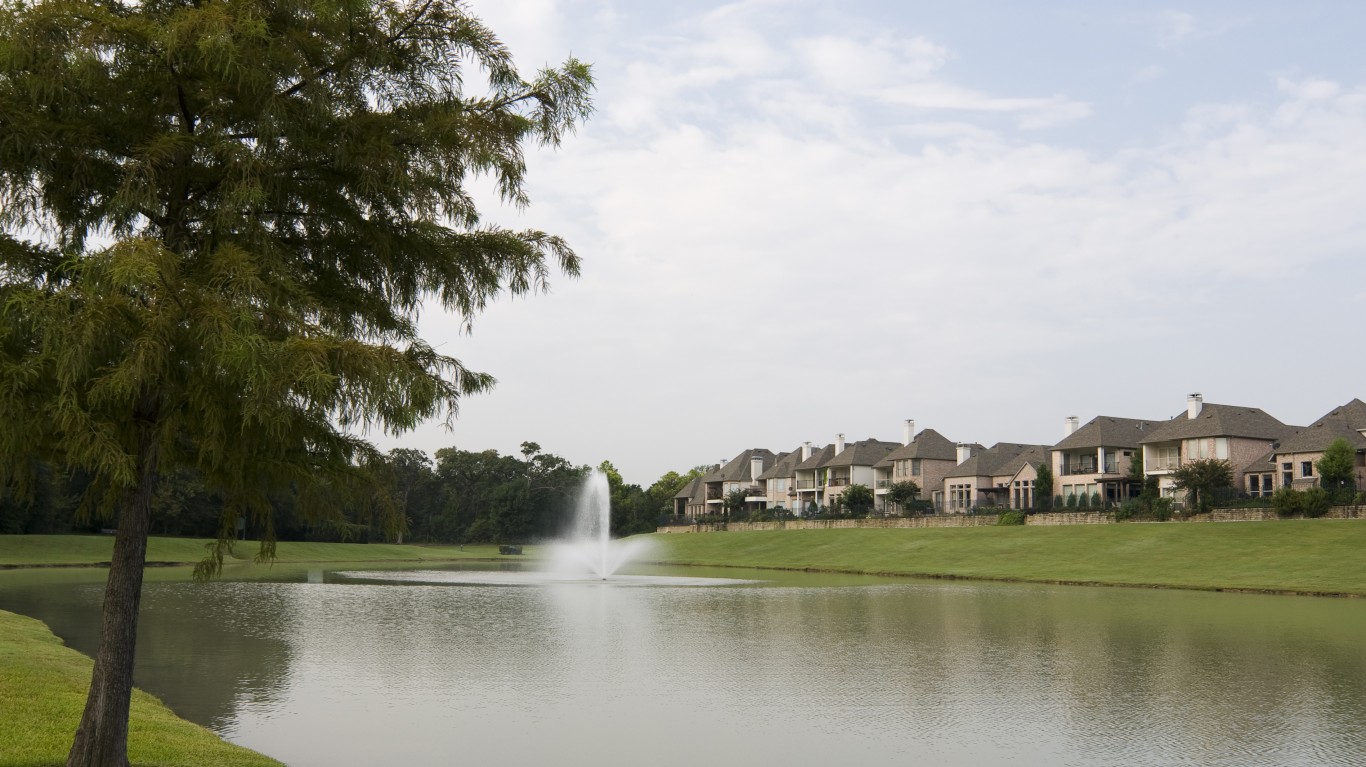
14. Richardson, Texas
> 2018 violent crime rate: 113.0 per 100,000 people
> 2018 homicides: 2
> Poverty rate: 10.2%
> 2018 unemployment rate: 3.2%
Richardson is a suburb slightly north of Dallas with a population of approximately 119,000. While there were 765 murders, rapes, robberies, and aggravated assaults reported per 100,000 residents in Dallas in 2018 — more than twice the national violent crime rate — Richardson is one of the safest cities in the country. There were just 113 violent crimes reported per 100,000 city residents, less than one-third the national rate of 369 violent crimes per 100,000 Americans.
Richardson’s low crime rate may have been a pull factor for the large number of residents who moved to the area over the past decade. From 2009 to 2018, the population of Richardson rose 16.4% — more than twice the national population growth rate of 6.6% over that time.
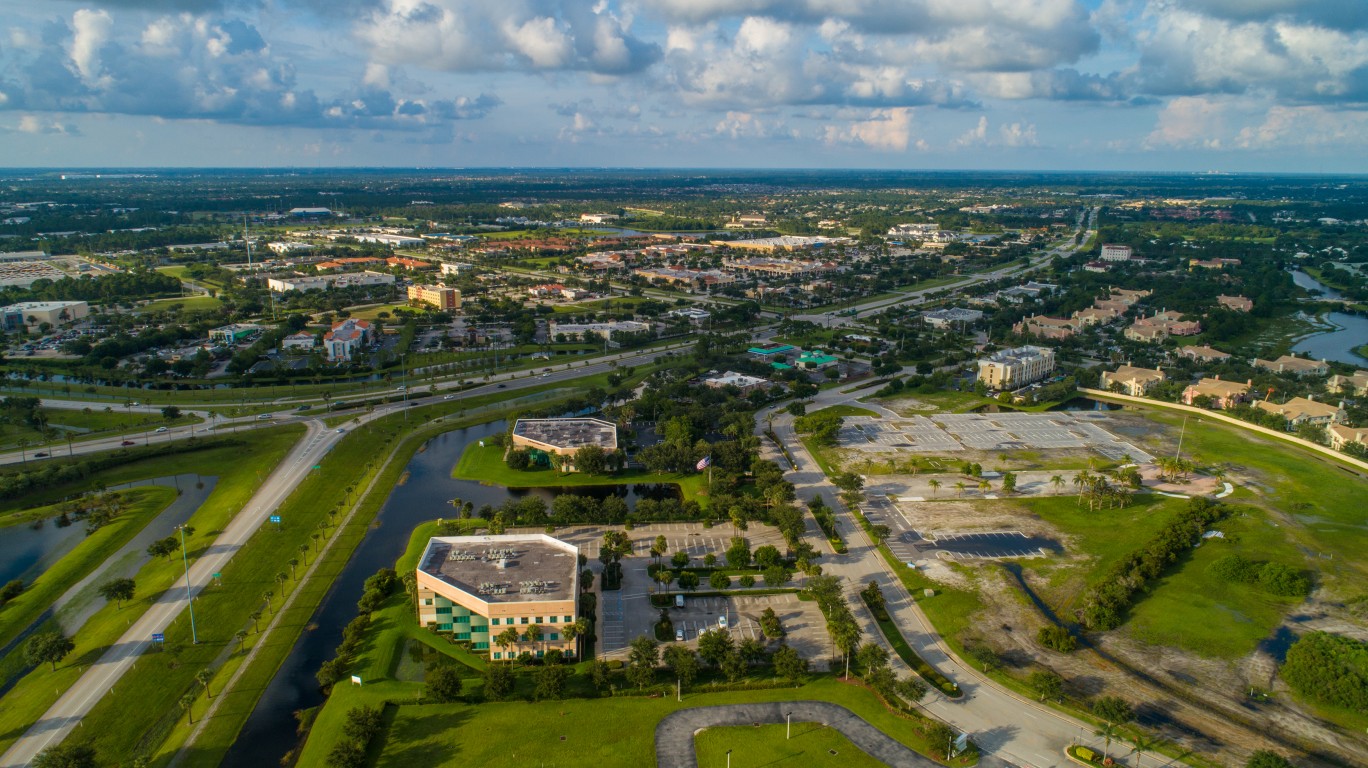
13. Port St. Lucie, Florida
> 2018 violent crime rate: 112.9 per 100,000 people
> 2018 homicides: 2
> Poverty rate: 12.1%
> 2018 unemployment rate: 3.8%
Port St. Lucie is a city of about 193,000 residents located near the Atlantic Coast of southeast Florida, approximately midway between Orlando and Miami. According to the FBI, there were two murders, 26 rapes, 31 robberies, and 159 aggravated assaults reported in Port St. Lucie in 2018. Adjusted for population, there were just 113 violent crimes reported per 100,000 city residents, less than one-third the national violent crime rate and the lowest rate of any city with at least 100,000 residents in Florida.
Income is one of the main correlates of violent crime, and a majority of households in the safest cities outearn the typical U.S. household by tens of thousands of dollars. In Port St. Lucie, however, the typical household earns $54,046 a year — about $3,600 less than the U.S. median household income.
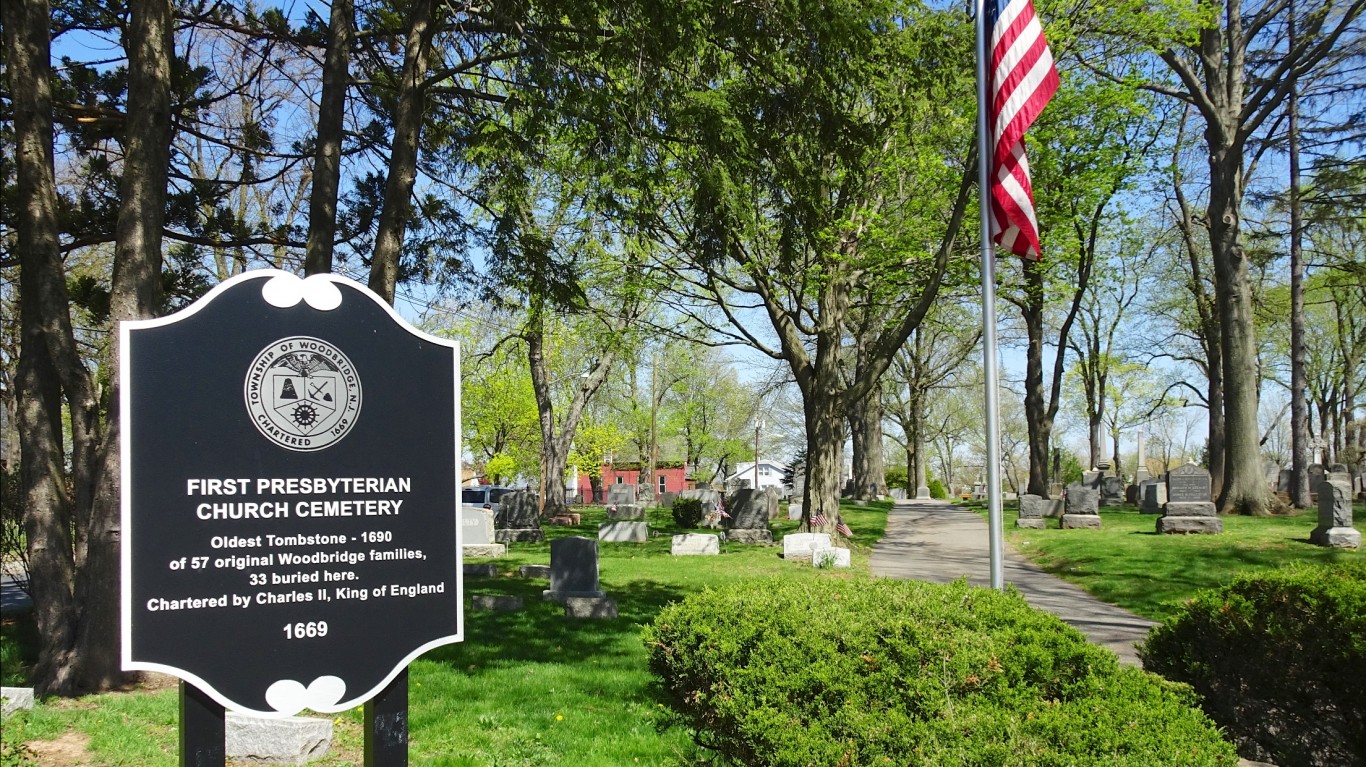
12. Woodbridge Township, New Jersey
> 2018 violent crime rate: 112.0 per 100,000 people
> 2018 homicides: 0
> Poverty rate: N/A
> 2018 unemployment rate: N/A
Located roughly 35 miles from midtown Manhattan, Woodbridge is one of several New Jersey townships in the New York metro area to rank among the safest cities in the United States. In 2018, there were no murders, six rapes, 32 robberies, and 75 aggravated assaults reported in Woodbridge. The population adjusted rate for each of these violent crimes in Woodbridge is less than half the corresponding national rate. In total, there were 112 violent crimes per 100,000 residents, less than one-third the national violent crime rate of 369 incidents per 100,000 Americans.
[in-text-ad-2]

11. Allen, Texas
> 2018 violent crime rate: 107.6 per 100,000 people
> 2018 homicides: 0
> Poverty rate: 5.1%
> 2018 unemployment rate: 3.2%
Allen is a suburb of approximately 103,168 residents located some 25 miles north of downtown Dallas. While there were 765 murders, rapes, robberies, and aggravated assaults reported per 100,000 residents in Dallas in 2018 — more than twice the national violent crime rate — Allen is one of the safest cities in the country. There were just 108 violent crimes reported per 100,000 residents in Allen, less than one-third the national rate of 369 violent crimes per 100,000 Americans. Similarly, while there were 3,249 property crimes reported per 100,000 residents in Dallas, but in Allen there were just 1,238 incidents per 100,000 — among the least of any city.
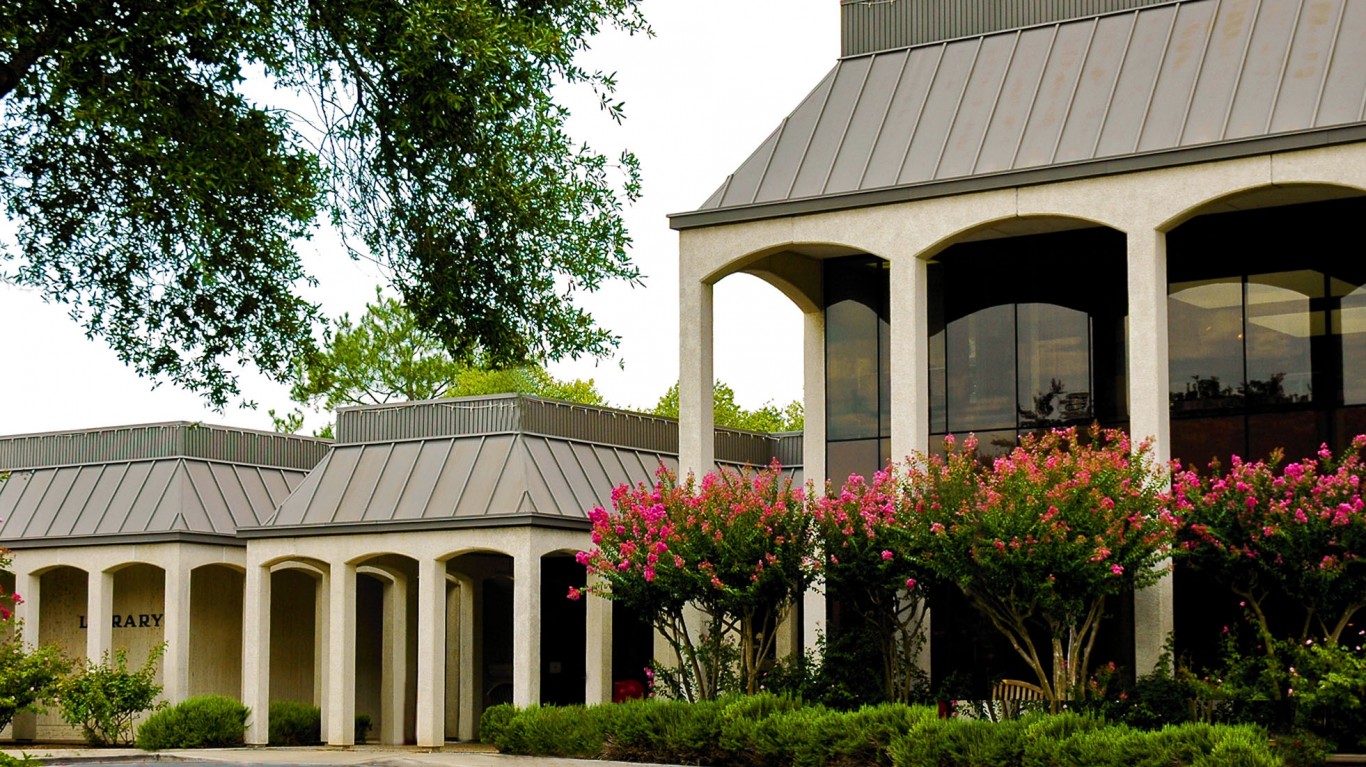
10. League City, Texas
> 2018 violent crime rate: 100.7 per 100,000 people
> 2018 homicides: 1
> Poverty rate: 6.2%
> 2018 unemployment rate: 3.6%
League City is a suburb of approximately 108,000 residents located approximately 25 miles southeast of downtown Houston. While Houston is one of the most dangerous cities in the country — there were 1,026 violent crimes reported per 100,000 residents in 2018 — League City is one of the safest. There were just 101 violent crimes reported per 100,000 residents in 2018, less than one-third the national rate of 369 violent crimes per 100,000 Americans.
League City’s low crime rate may be one factor attracting new residents to the area. From 2009 to 2018, the city’s population jumped by 44.8% — nearly seven times the 6.6% national growth rate.
[in-text-ad]

9. Glendale, California
> 2018 violent crime rate: 98.7 per 100,000 people
> 2018 homicides: 1
> Poverty rate: 15.6%
> 2018 unemployment rate: 4.4%
Glendale is a suburb of approximately 205,000 residents located just north of Los Angeles. In 2018, there were just 99 violent crimes reported per 100,000 residents in Glendale, the fourth lowest rate of any city with a population of at least 100,000 in California and the ninth lowest nationwide.
While wealth is one of the main determinants of crime, and many of the safest cities in the country are among the wealthiest, Glendale is about as wealthy as the U.S. as a whole. The typical Glendale household earns $58,657 a year, only about $1,000 more than the $57,652 national median household income. Similarly, some 15.6% of residents live in poverty, slightly higher than the 14.6% national poverty rate.
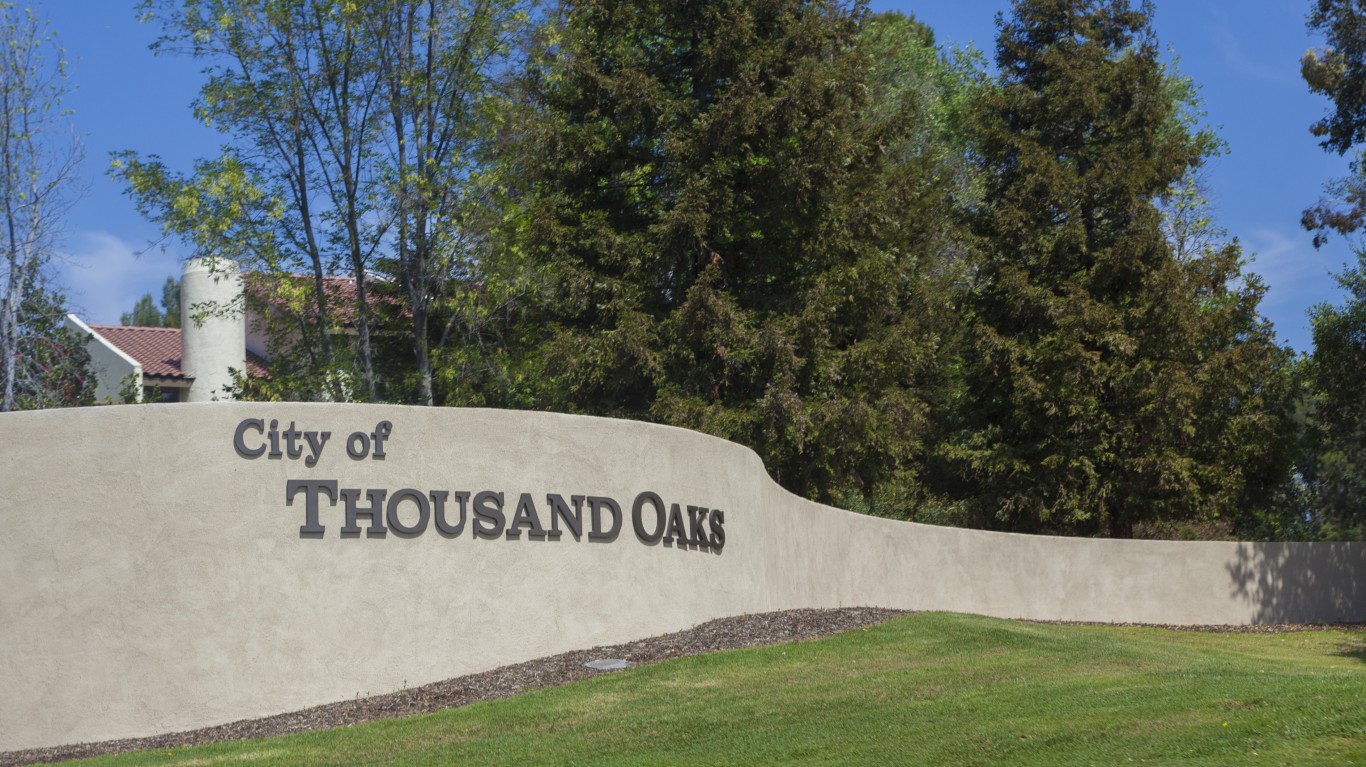
8. Thousand Oaks, California
> 2018 violent crime rate: 97.4 per 100,000 people
> 2018 homicides: 14
> Poverty rate: 5.7%
> 2018 unemployment rate: 3.0%
There were a total of 97 violent crimes reported per 100,000 residents in Thousand Oaks in 2018, less than one-third the national violent crime rate of 369 incidents per 100,000 people and the eighth lowest rate of any U.S. city with a population of at least 100,000.
While Thousand Oaks is one of the safest cities in the country, in November 2018 a mass shooting took place there that left 13 dead, including the gunman. In total, there were 11 homicides per 100,000 residents in Thousand Oaks in 2018, more than twice the national homicide rate of 5 murders per 100,000 Americans.
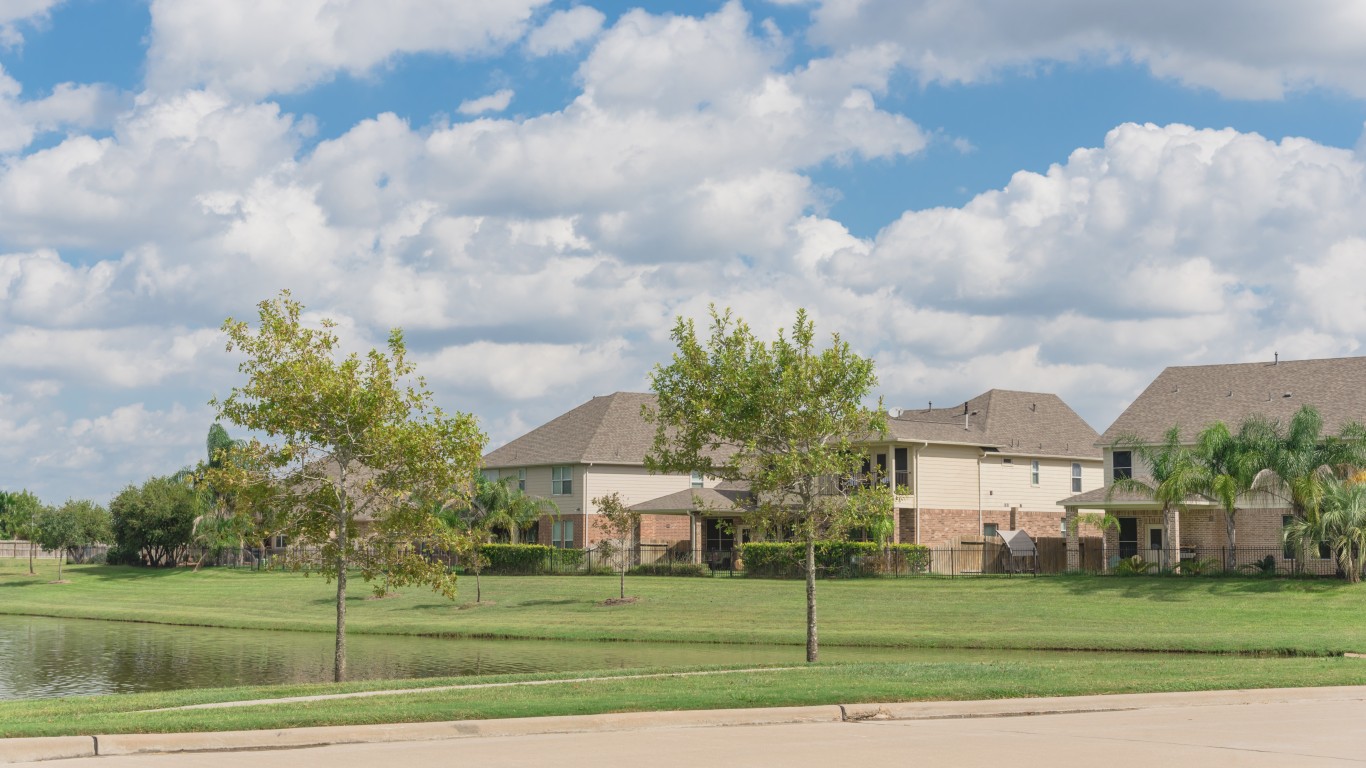
7. Pearland, Texas
> 2018 violent crime rate: 95.0 per 100,000 people
> 2018 homicides: 2
> Poverty rate: 3.8%
> 2018 unemployment rate: 3.4%
Pearland is one of several suburbs in the Houston metro area to rank among the safest cities in the United States. While there were 1,026 murders, rapes, robberies, and aggravated assaults reported per 100,000 residents in Houston in 2018 — nearly three times the national violent crime rate — Pearland is one of the safest cities in the country. In 2018, there were 95 violent crimes reported per 100,000 residents in Pearland, compared to the national rate of 369 incidents per 100,000 Americans.
Like many of the cities with the lowest crime rates, Pearland has experienced rapid population growth over the past decade. From 2009 to 2018, the city’s population rose 40.3% — more than six times the 6.6% national growth rate.
[in-text-ad-2]
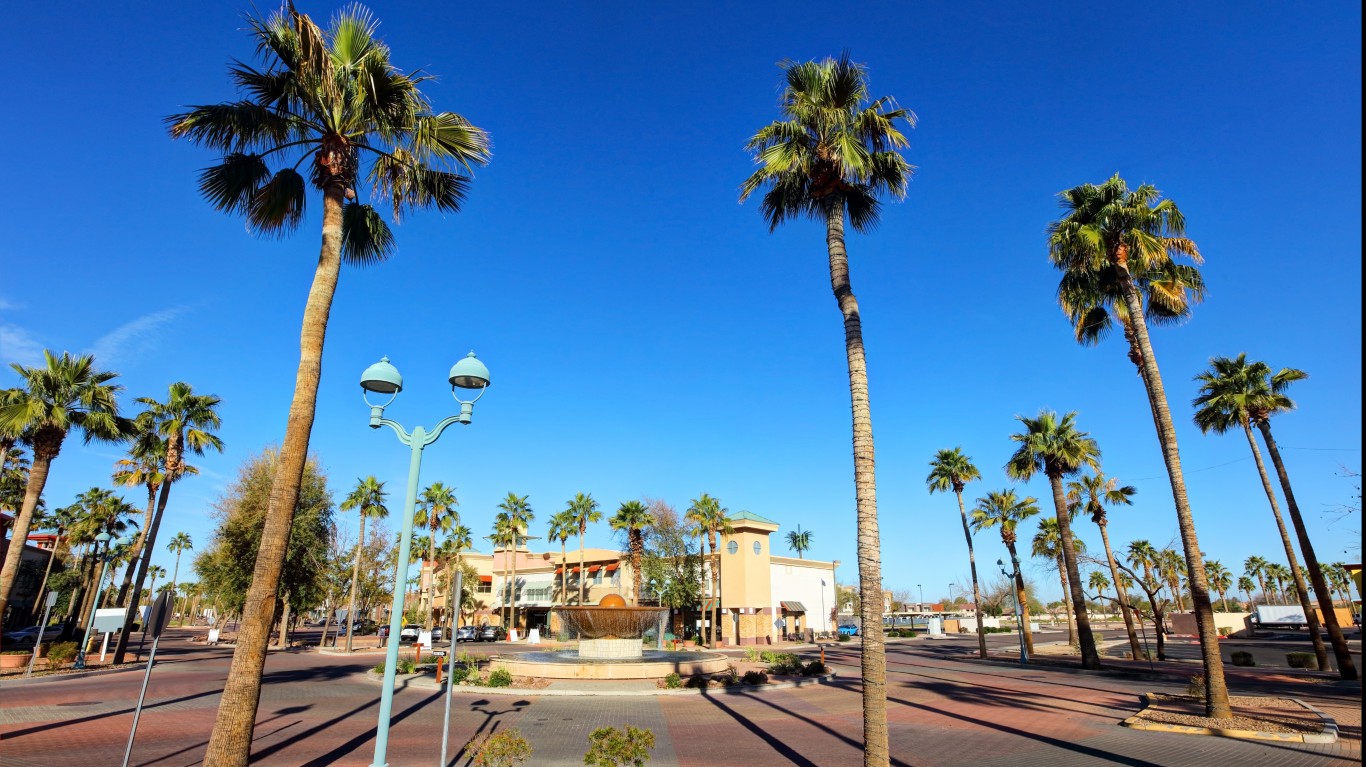
6. Gilbert, Arizona
> 2018 violent crime rate: 94.6 per 100,000 people
> 2018 homicides: 2
> Poverty rate: 5.9%
> 2018 unemployment rate: 3.5%
Gilbert is a suburb of approximately 232,000 residents located some 20 miles southeast of Phoenix. According to the most recent FBI data, in 2018 there were two murders, 75 rapes, 32 robberies, and 125 aggravated assaults reported in Gilbert. Adjusted for population, there were just 95 violent crimes per 100,000 Gilbert residents, less than one-third the national violent crime rate of 369 incidents per 100,000 Americans and the least of any city in Arizona with a population of at least 100,000.
Wealthier cities typically have lower crime rates than poorer places. In Gilbert, the typical household earns $87,566, the most of any city with at least 100,000 people in Arizona and well above the national median household income of $57,652.

5. Frisco, Texas
> 2018 violent crime rate: 86.8 per 100,000 people
> 2018 homicides: 2
> Poverty rate: 3.9%
> 2018 unemployment rate: 3.1%
Frisco is one of several wealthy, fast-growing suburbs of the Dallas metro area to rank among the safest cities in the United States. The typical household in Frisco earns $120,701 a year, more than twice the $57,652 national median household income. Similarly, just 3.9% of residents live in poverty, compared to 14.6% of Americans nationwide. From 2009 to 2018, the population of Frisco rose by 73.6% — more than 11 times the 6.6% national growth rate.
While the relationship between wealth and crime is complicated, crime tends to be less prevalent in high-income cities. In Frisco, there were just 87 violent crimes reported per 100,000 residents in 2018, less than one-fourth the national violent crime rate.
[in-text-ad]
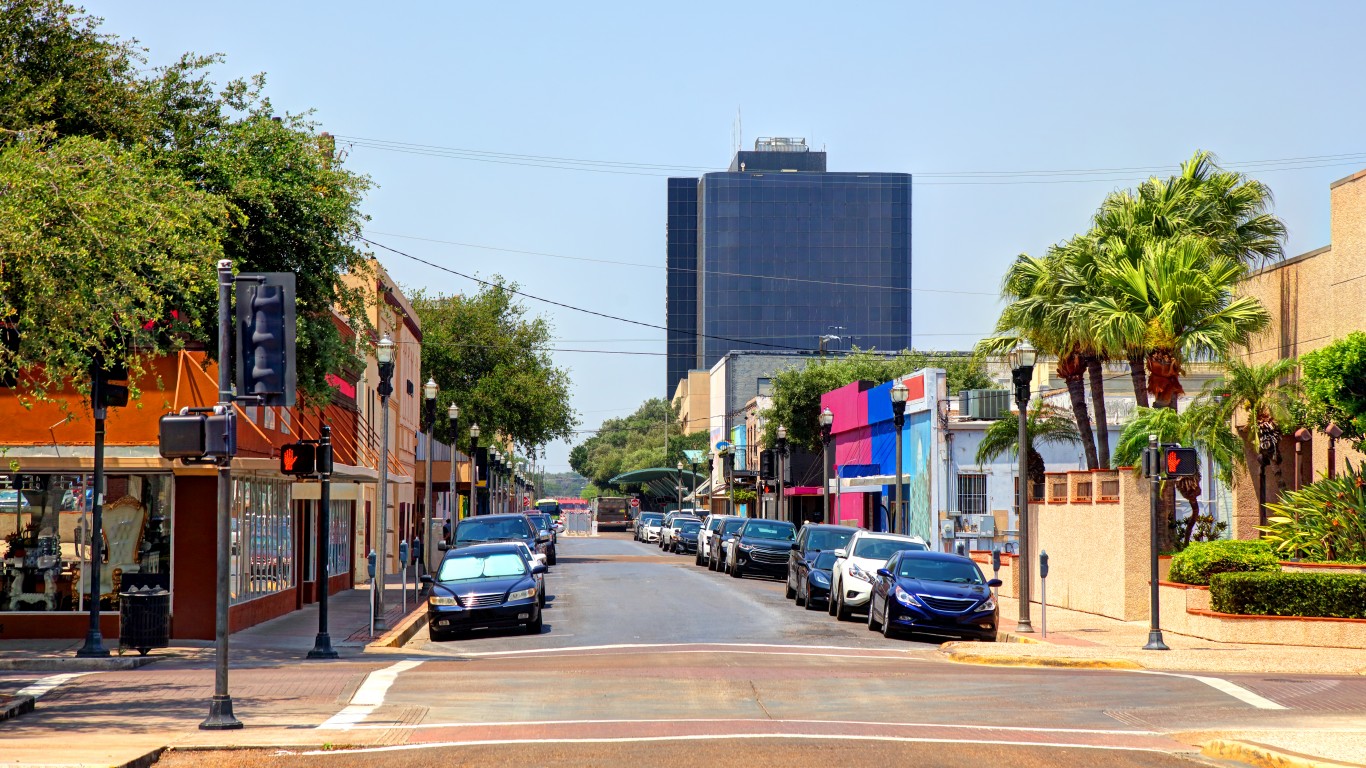
4. McAllen, Texas
> 2018 violent crime rate: 84.5 per 100,000 people
> 2018 homicides: 0
> Poverty rate: 25.2%
> 2018 unemployment rate: 4.7%
McAllen is a city of approximately 144,000 residents located in the southern tip of Texas along the U.S.-Mexico border. In 2018, there were just 85 violent crimes reported per 100,000 residents in McAllen, less than one-fourth the national violent crime rate of 369 incidents per 100,000 Americans and the least of any midsize to large city in Texas.
While crime is disproportionately concentrated in low-income areas and many of the safest cities in the United States are among the wealthiest, McAllen is one of the least wealthy cities in the country. Some 25.2% of McAllen residents live in poverty, far more than the 14.6% national poverty rate.
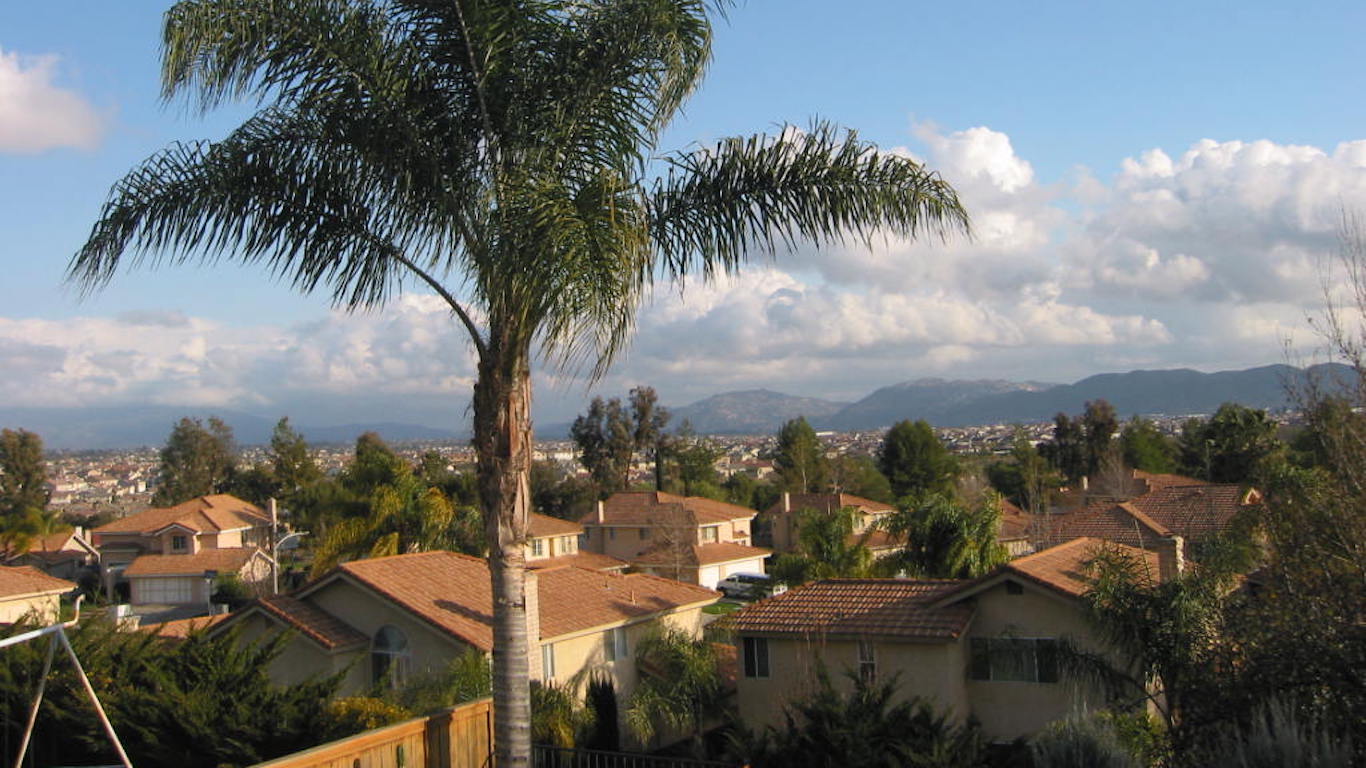
3. Murrieta, California
> 2018 violent crime rate: 80.2 per 100,000 people
> 2018 homicides: 2
> Poverty rate: 8.9%
> 2018 unemployment rate: 3.5%
According to FBI data, there were two murders, 16 rapes, 35 robberies, and 39 aggravated assaults reported in Murrieta in 2018. Adjusted for population, there were just 80 violent crimes per 100,000 Murrieta residents, less than one-fourth the national violent crime rate of 369 incidents per 100,000 Americans.
The prevalence of property crime in Murrieta is similarly low. In 2018, there were just 1,231 burglaries, larceny-thefts, and motor vehicle thefts per 100,000 residents in Murrieta, far less than the national property crime rate of 2,200 incidents per 100,000 Americans.

2. Naperville, Illinois
> 2018 violent crime rate: 68.7 per 100,000 people
> 2018 homicides: 0
> Poverty rate: 4.4%
> 2018 unemployment rate: 3.0%
Naperville is a suburb of approximately 145,000 residents located approximately 30 miles west of downtown Chicago. While Chicago is one of the most dangerous cities in the country — there were 1,006 violent crimes reported per 100,000 Chicago residents in 2018, more than twice the national figure — Naperville is one of the safest. In 2018, there were just 69 violent crimes reported per 100,000 Naperville residents, far less than the national violent crime rate of 369 incidents per 100,000 Americans and the second lowest rate of any city with a population of at least 100,000.
[in-text-ad-2]

1. Irvine, California
> 2018 violent crime rate: 55.5 per 100,000 people
> 2018 homicides: 0
> Poverty rate: 13.2%
> 2018 unemployment rate: 2.8%
According to the most recent FBI data, there were zero murders, 40 rapes, 53 robberies, and 67 aggravated assaults reported in Irvine in 2018. Adjusted for population, there were just 56 violent crimes reported per 100,000 Irvine residents, by far the lowest rate of any U.S. city with a population of at least 100,000 and less than one-sixth the national violent crime rate.
The low prevalence of crime may have been a pull factor for the large influx of residents who moved to Irvine over the past decade. From 2009 to 2018, the population of Irvine grew by 33.6%, more than five times the 6.6% national growth rate.
Methodology
To identify the 50 safest U.S. cities, 24/7 Wall St. reviewed violent crime rates in cities with at least 100,000 people from the FBI’s 2018 Uniform Crime Report. The total number and the rates of murder, non-negligent manslaughter, rape, robbery, and aggravated assault, which are included in the violent crime rate, as well as burglaries, larceny, and motor vehicle theft, which are classified as property crime, also came from the FBI’s report.
We considered ten year population change using data from the FBI.
Annual unemployment rates for 2018 came from the Bureau of Labor Statistics. Median household income and poverty rates came from the U.S. Census Bureau’s 2017 American Community Survey and are five-year averages.
The Average American Is Losing Momentum On Their Savings Every Day (Sponsor)
If you’re like many Americans and keep your money ‘safe’ in a checking or savings account, think again. The average yield on a savings account is a paltry .4%1 today. Checking accounts are even worse.
But there is good news. To win qualified customers, some accounts are paying more than 7x the national average. That’s an incredible way to keep your money safe and earn more at the same time. Our top pick for high yield savings accounts includes other benefits as well. You can earn a $200 bonus and up to 7X the national average with qualifying deposits. Terms apply. Member, FDIC.
Click here to see how much more you could be earning on your savings today. It takes just a few minutes to open an account to make your money work for you.
Thank you for reading! Have some feedback for us?
Contact the 24/7 Wall St. editorial team.
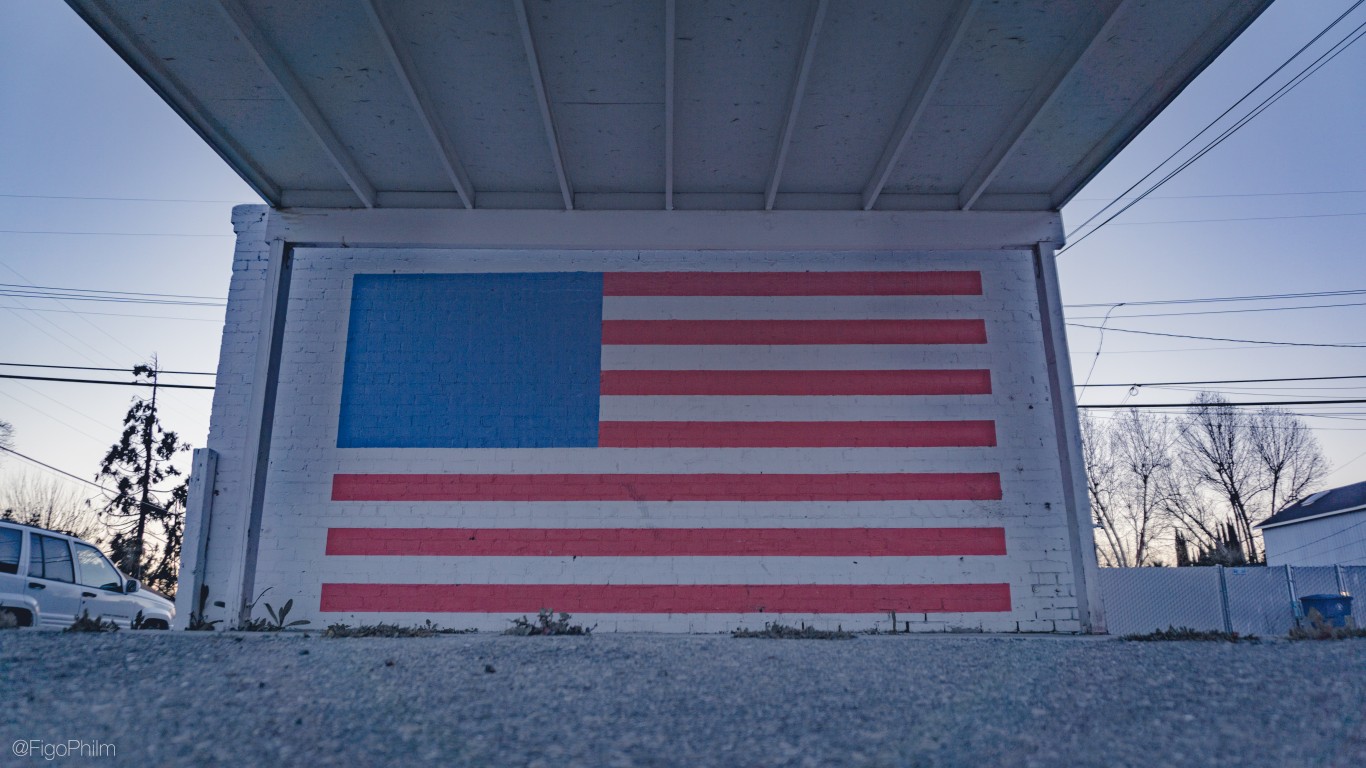
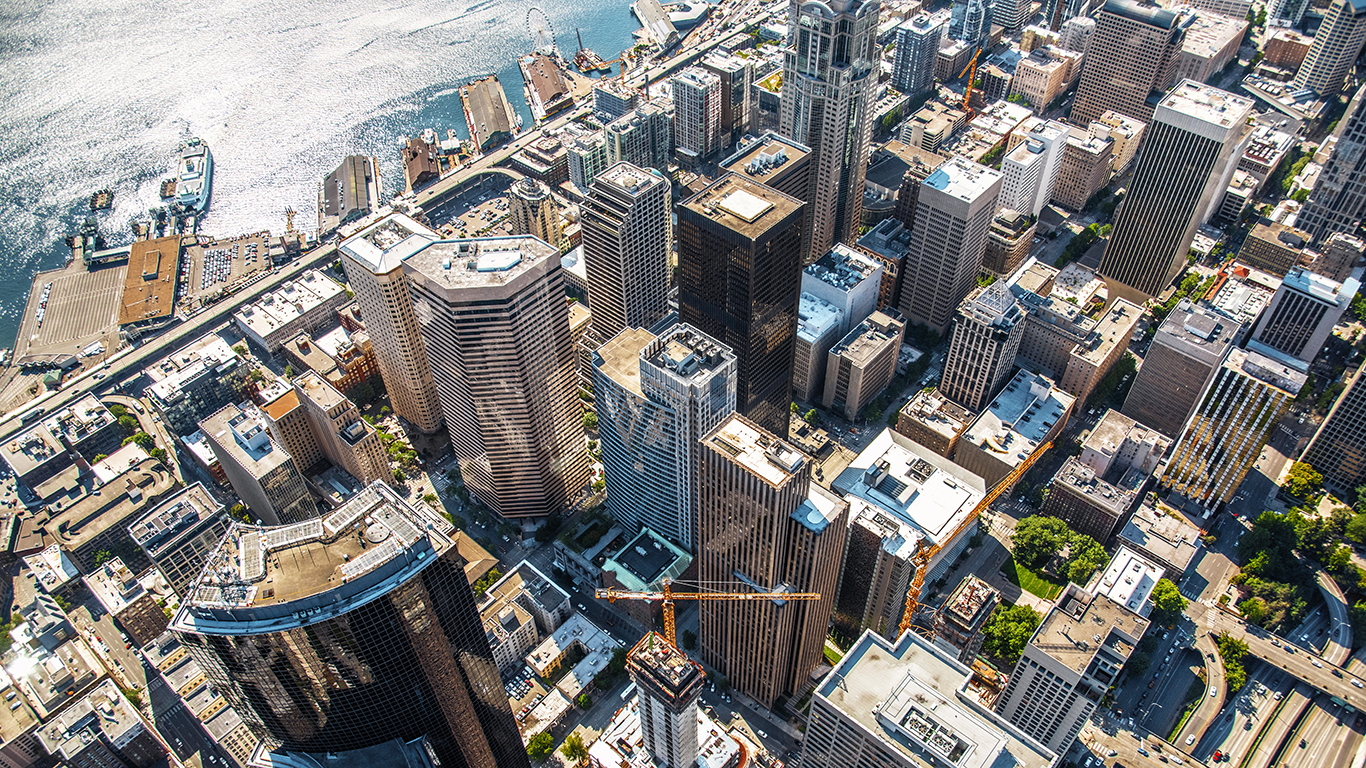 24/7 Wall St.
24/7 Wall St.
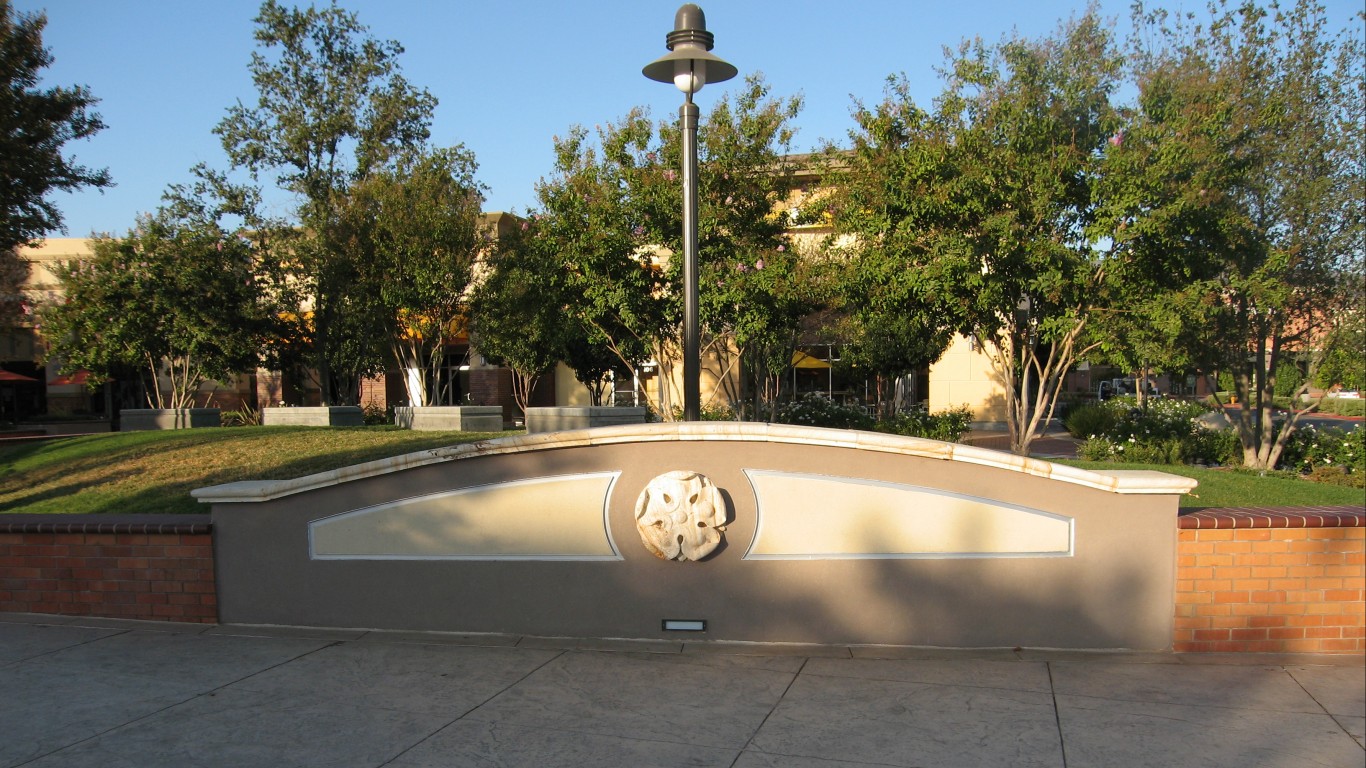
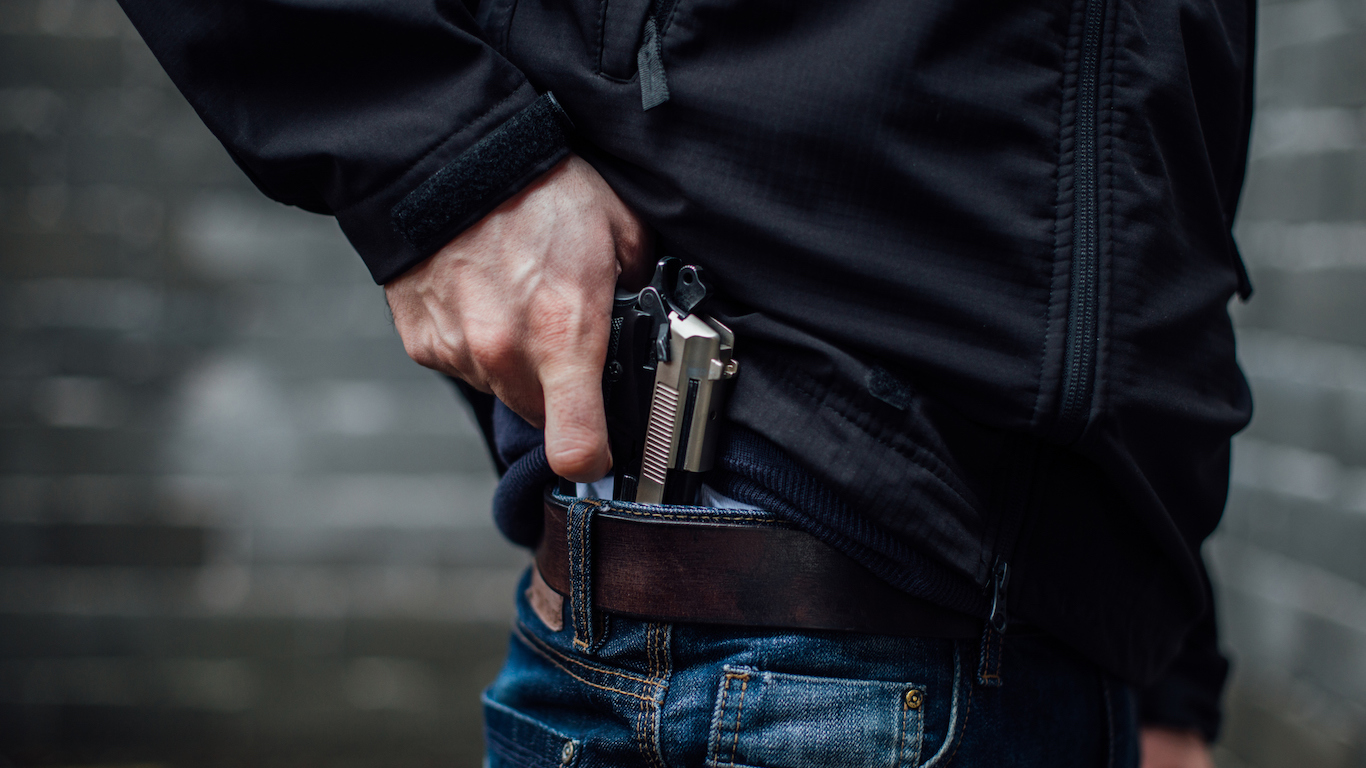 24/7 Wall St.
24/7 Wall St.
 24/7 Wall St.
24/7 Wall St.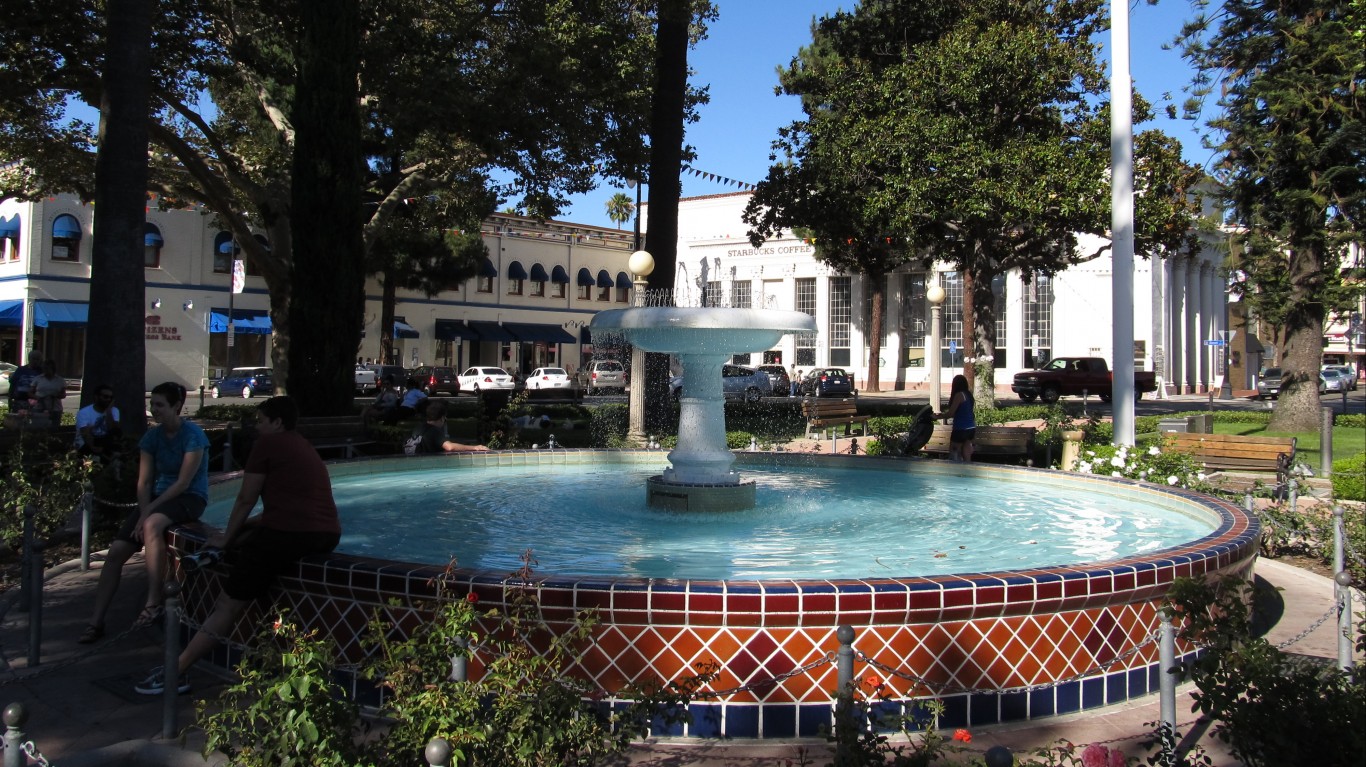
 24/7 Wall St.
24/7 Wall St.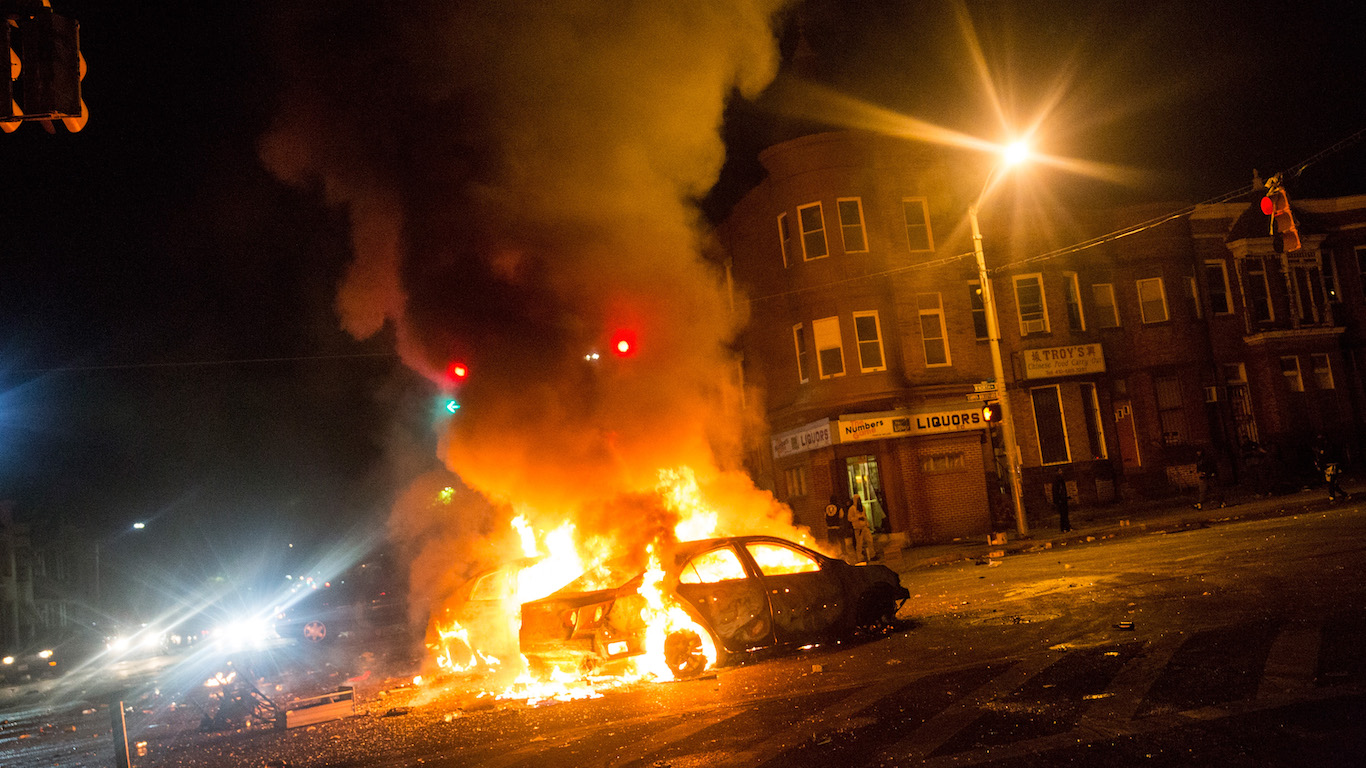 24/7 Wall St.
24/7 Wall St.
